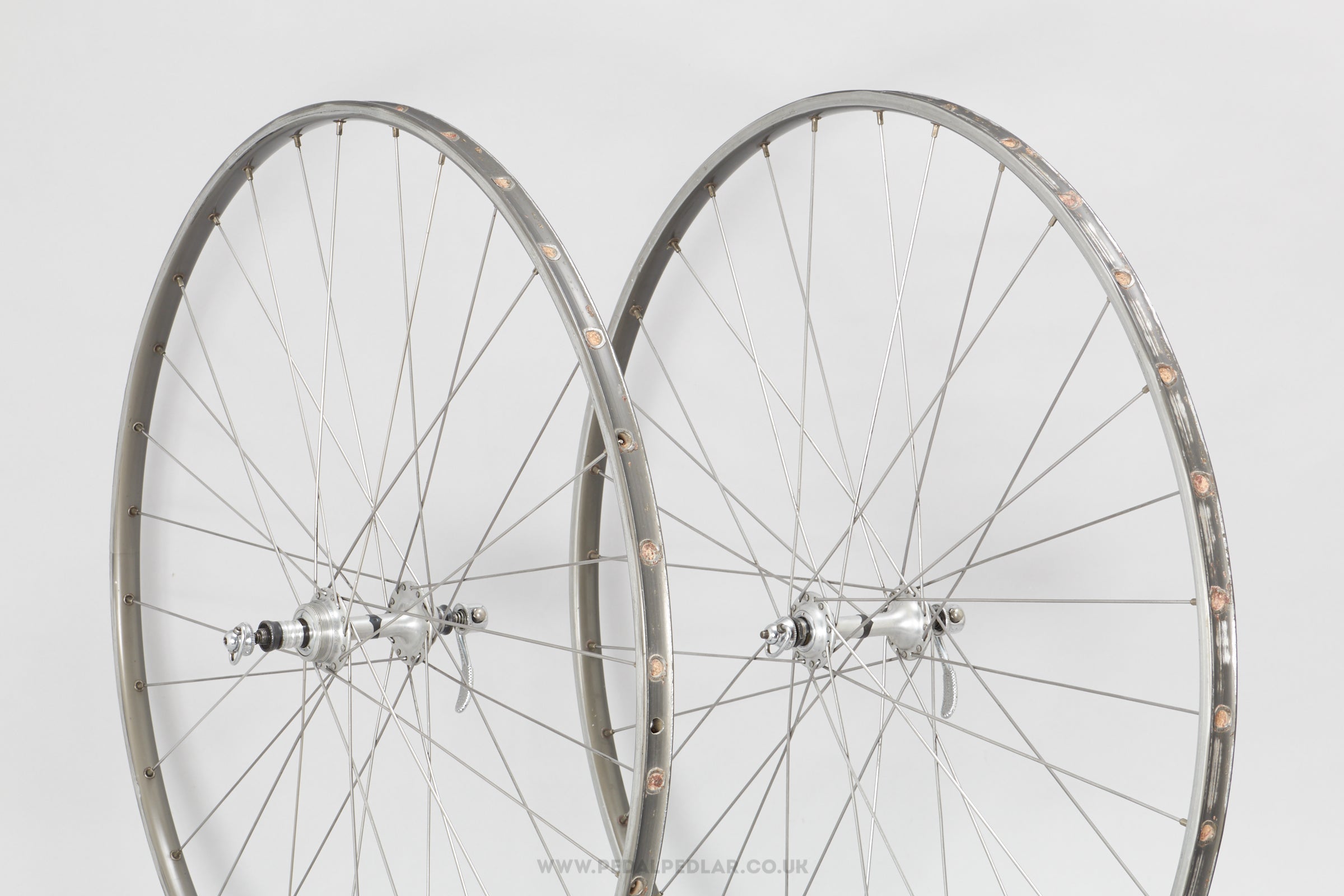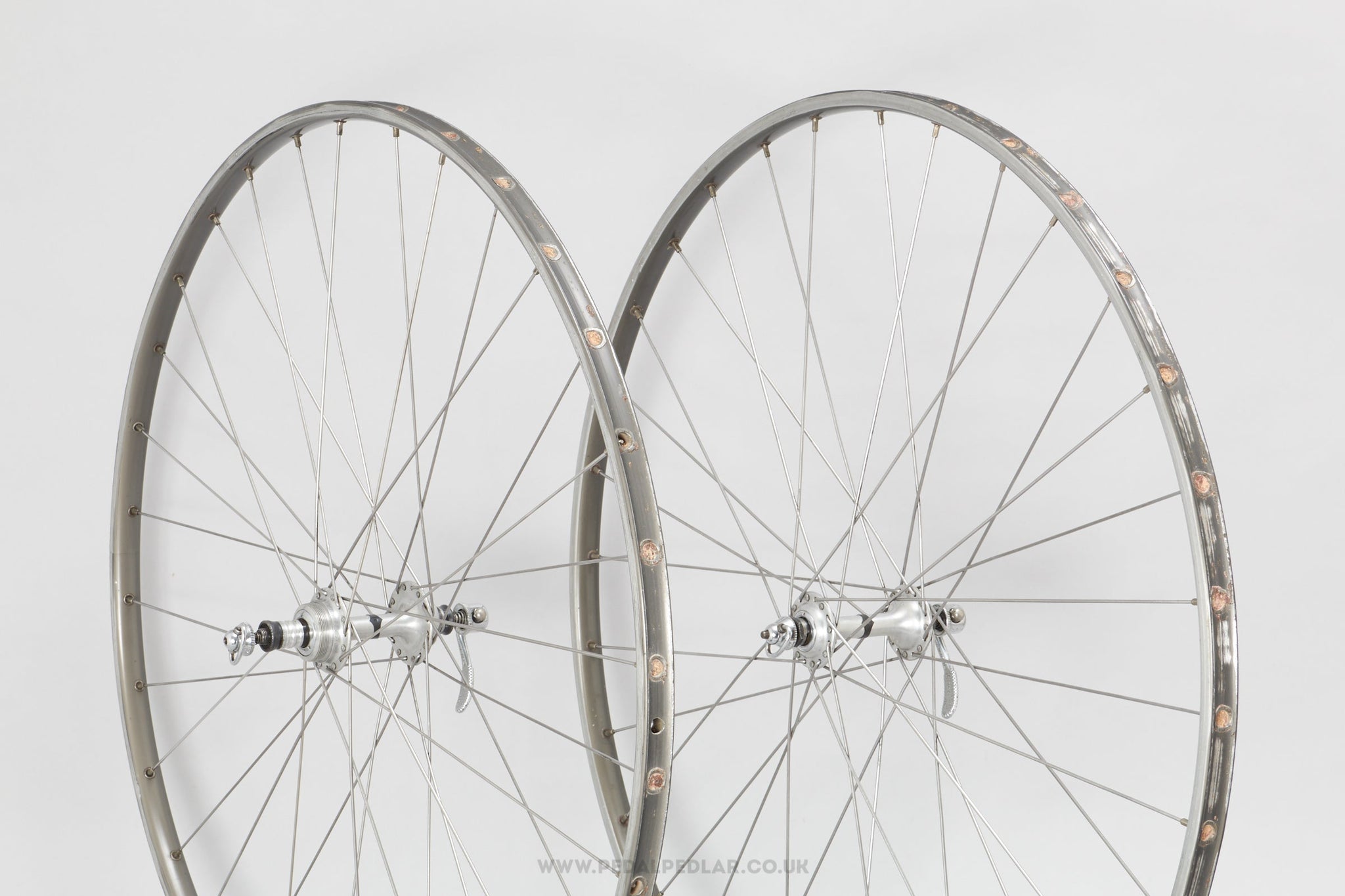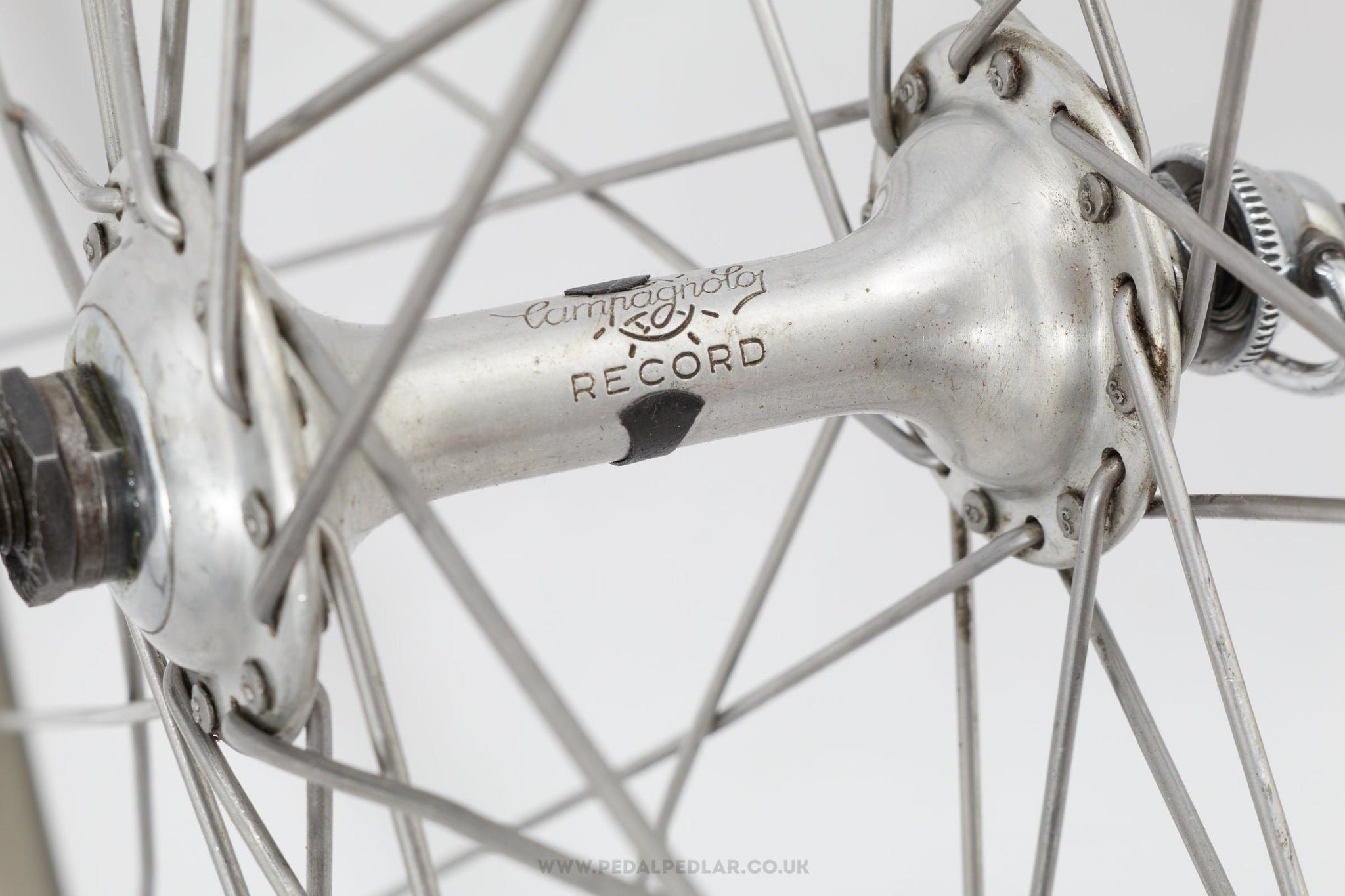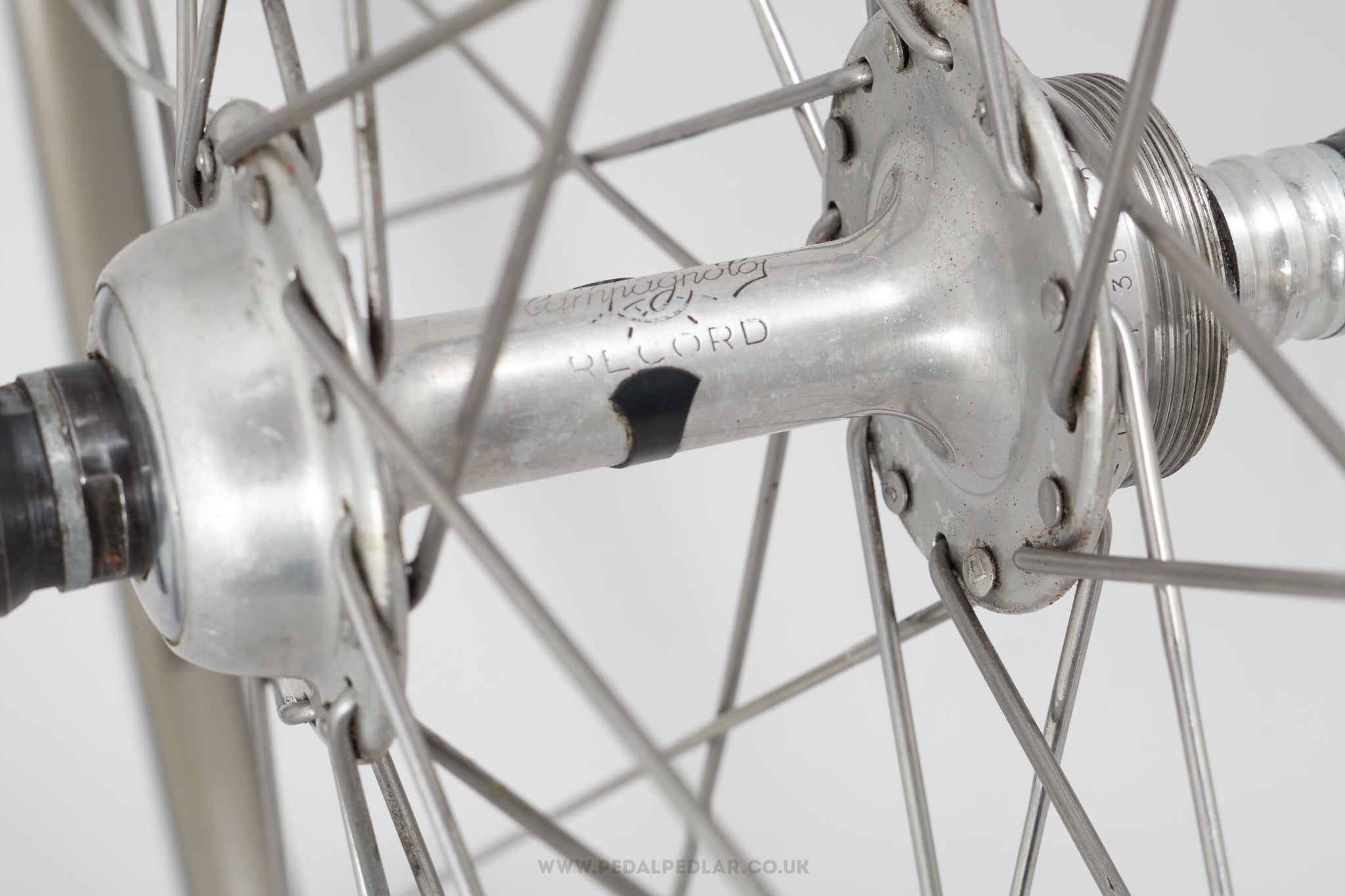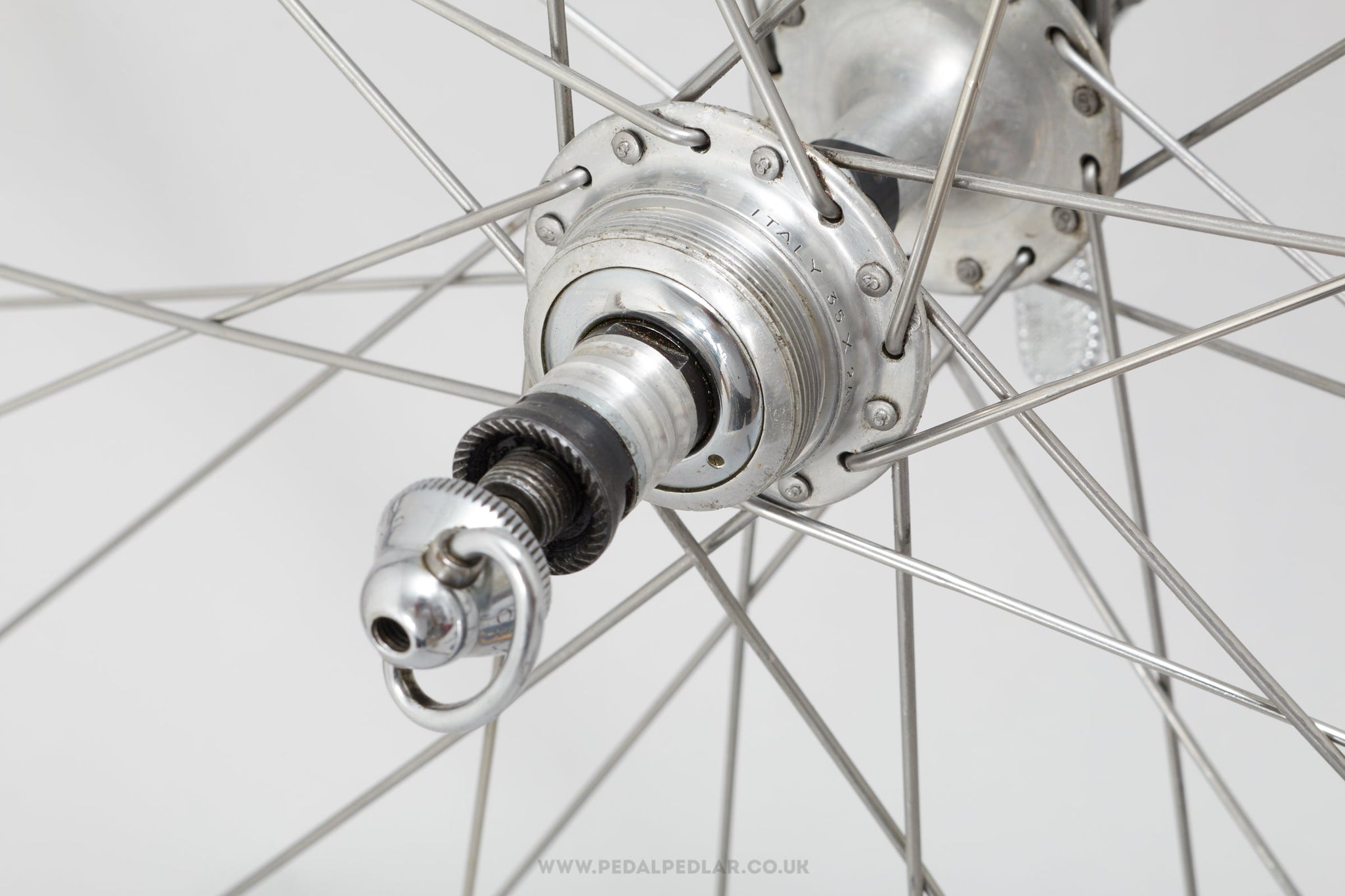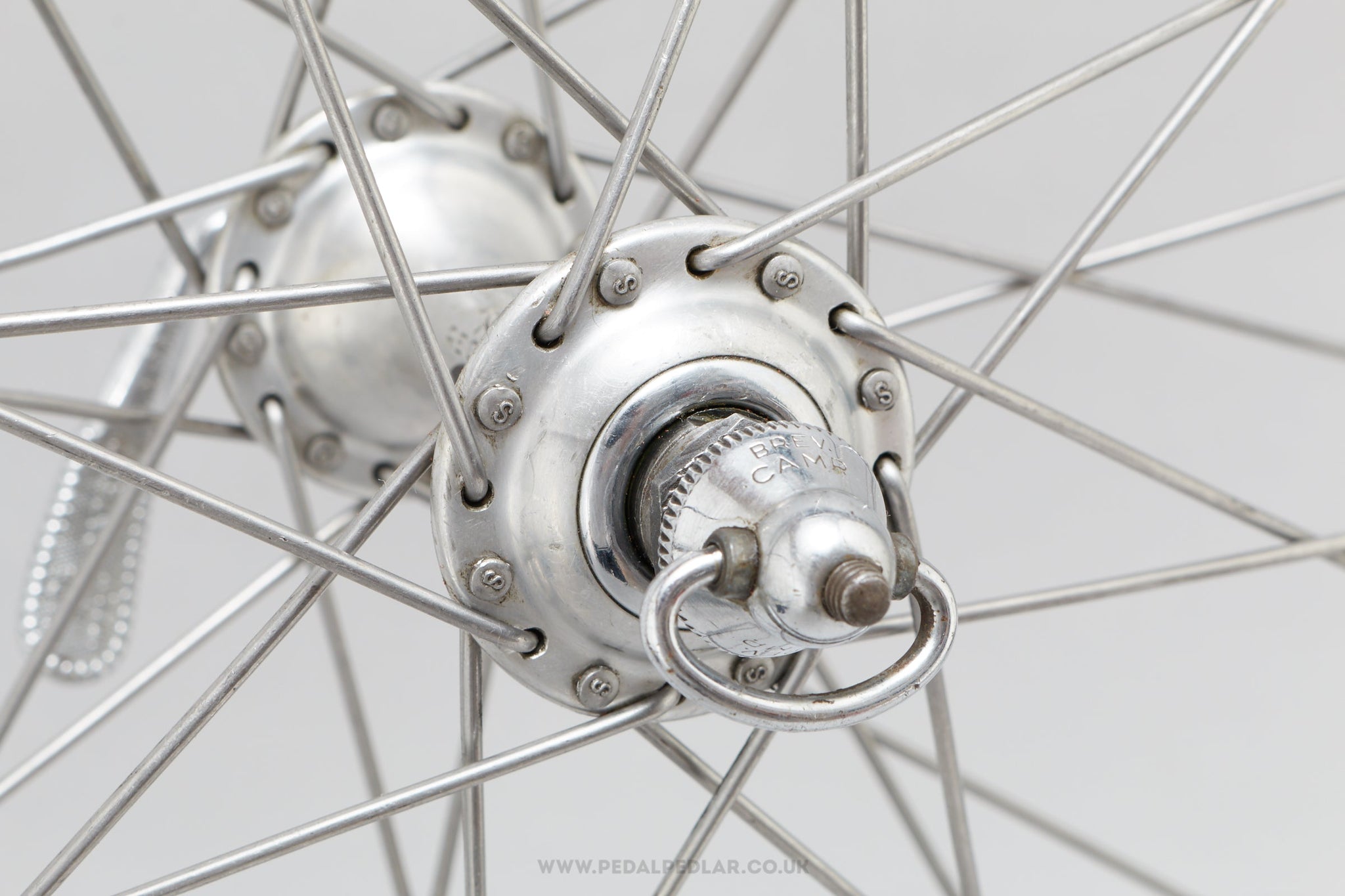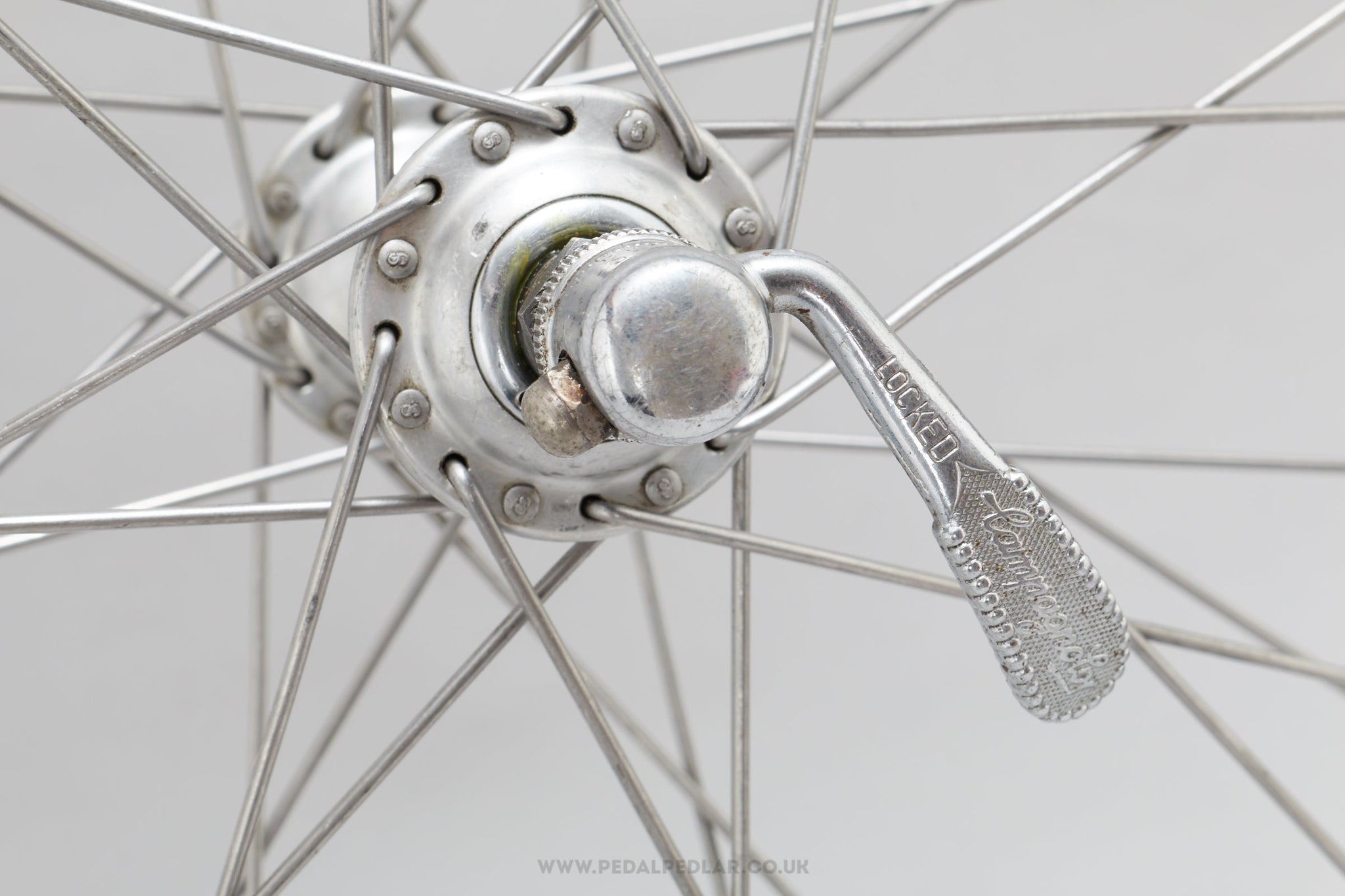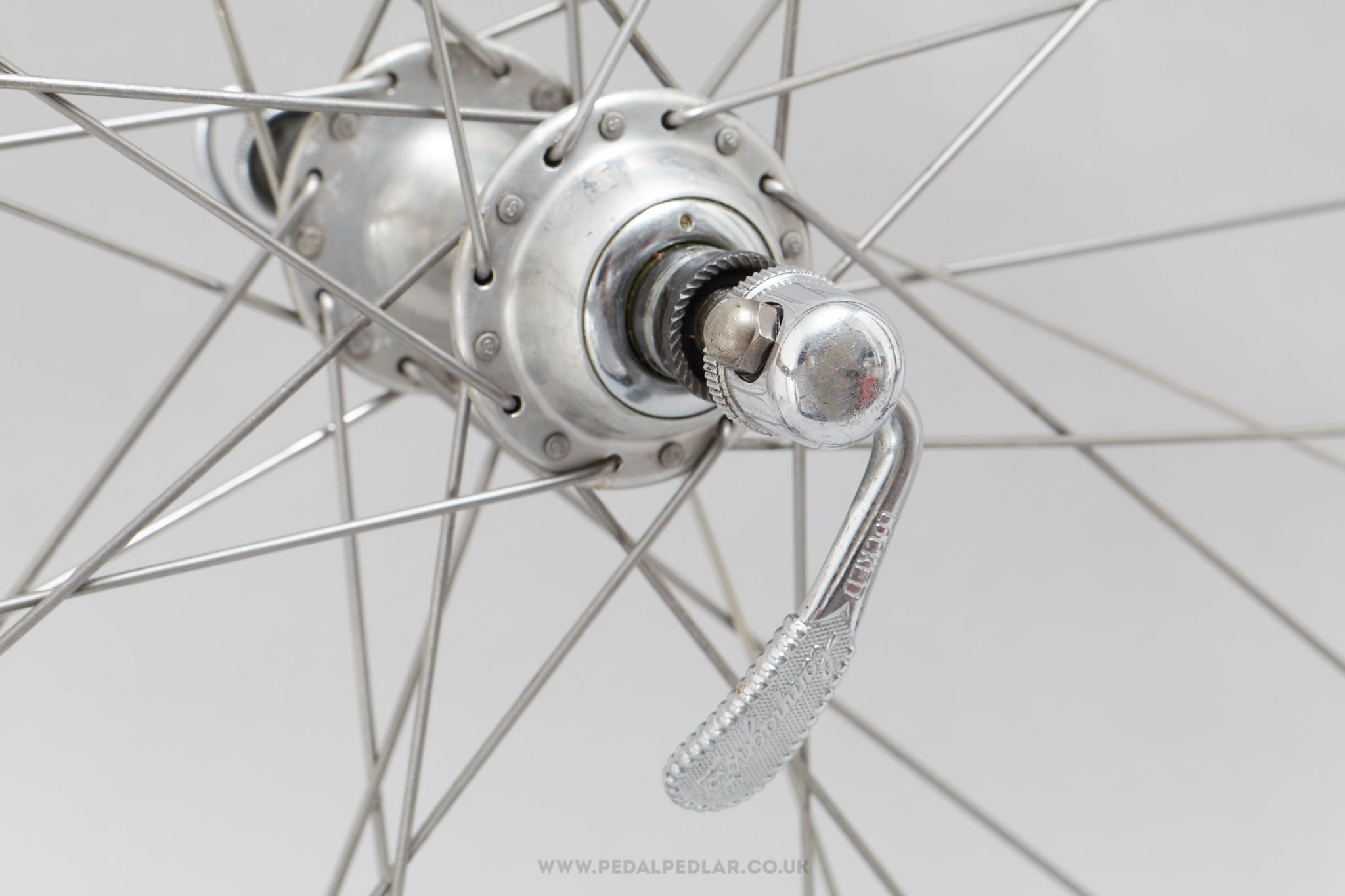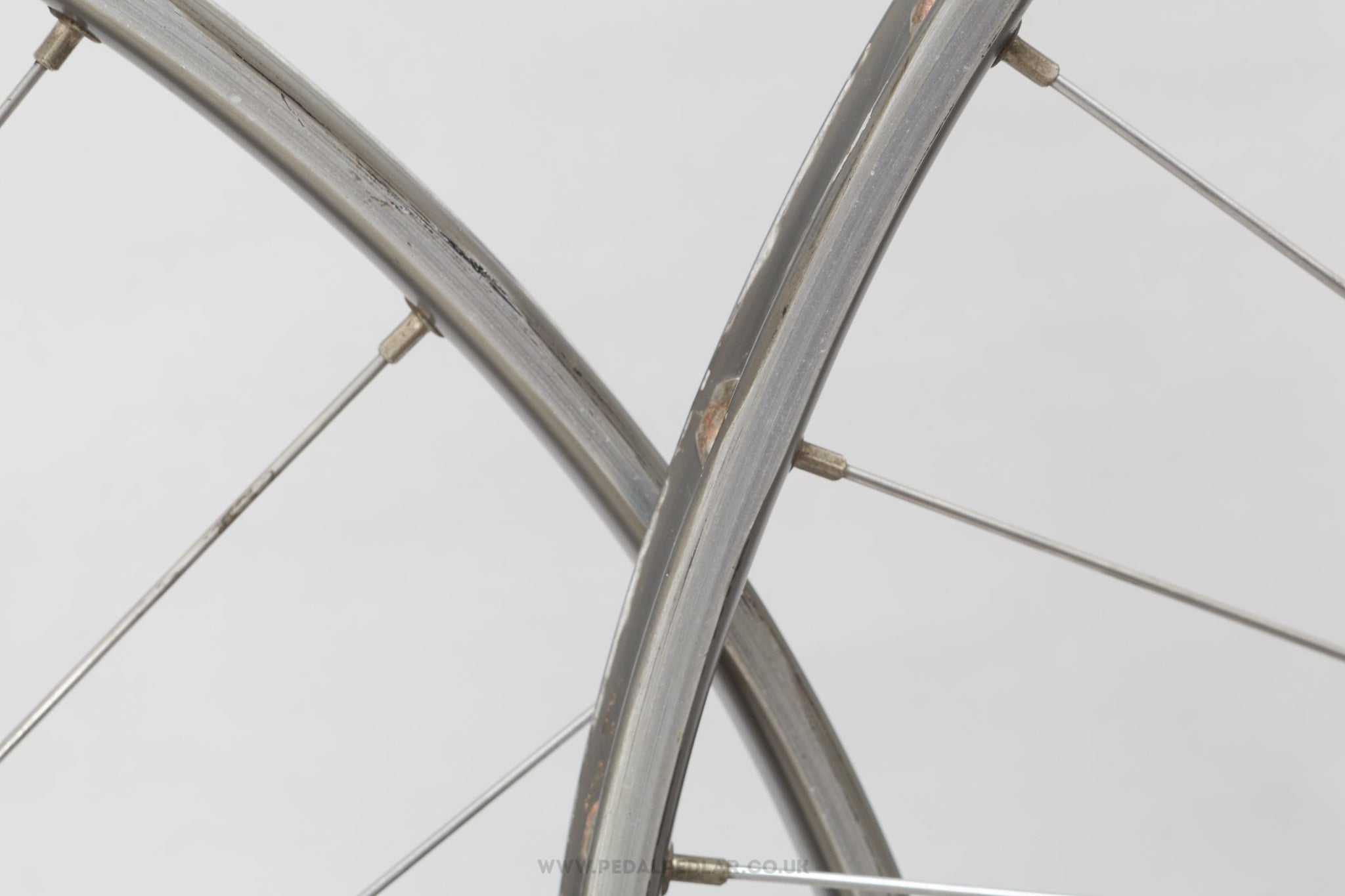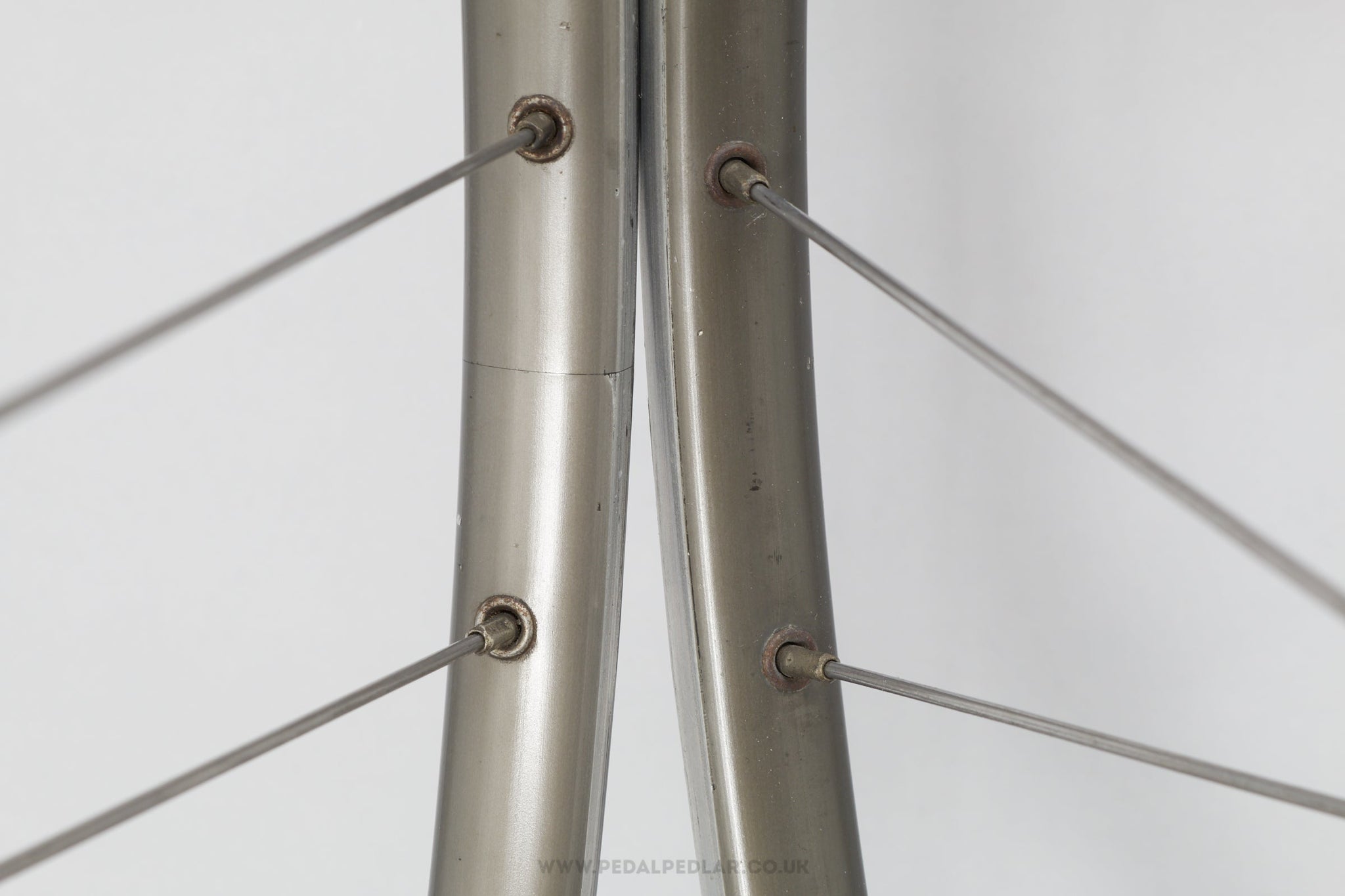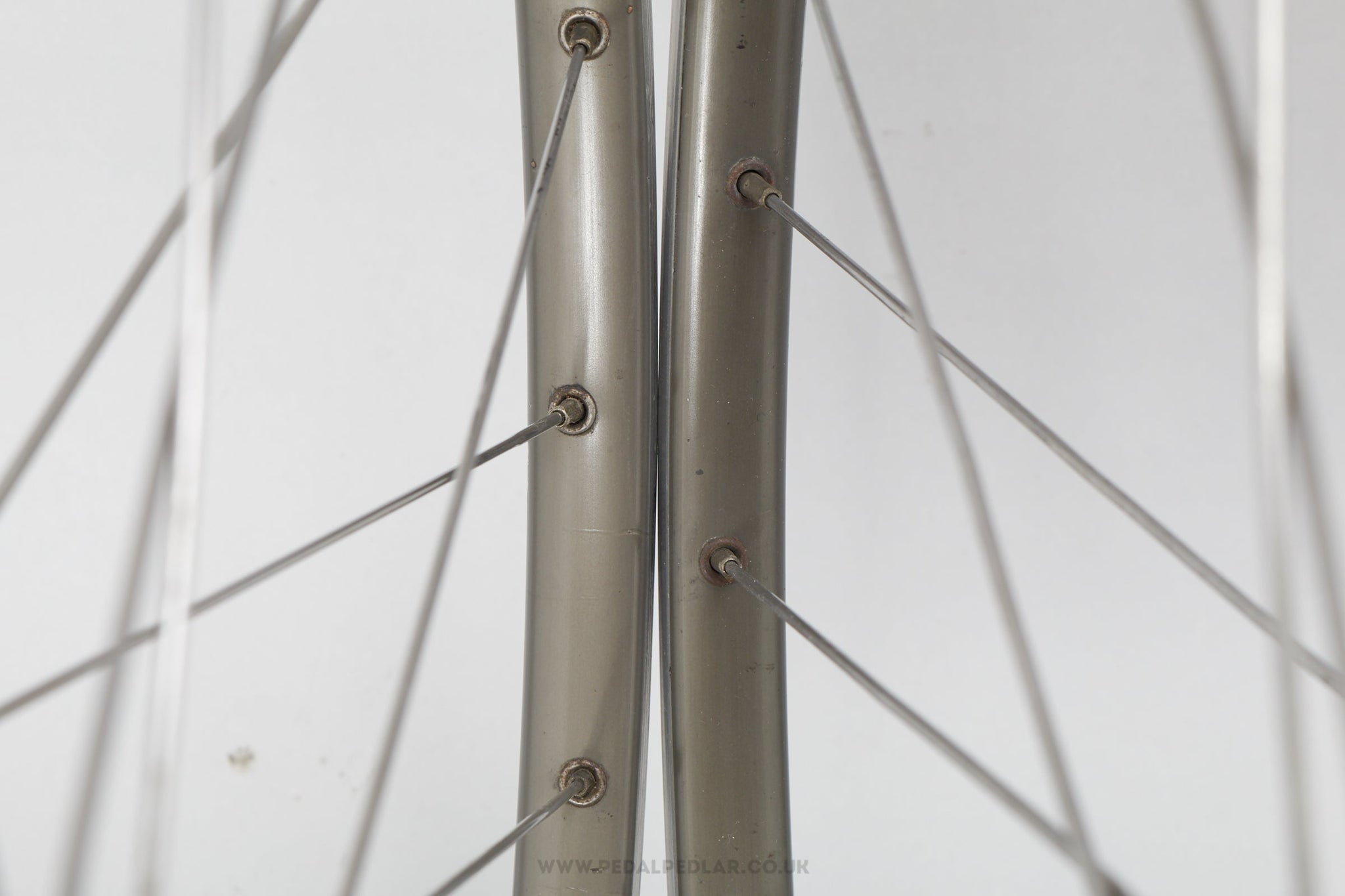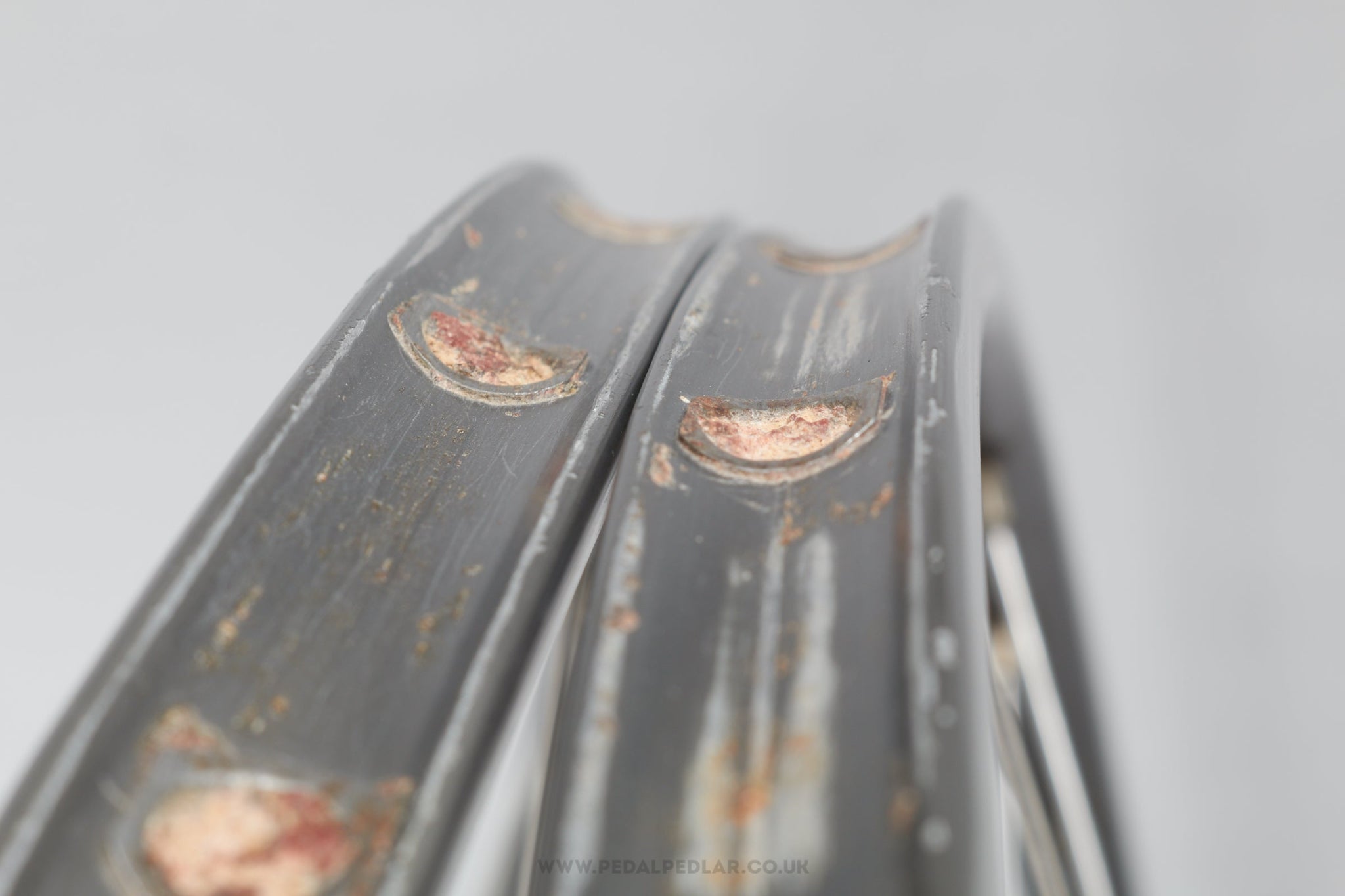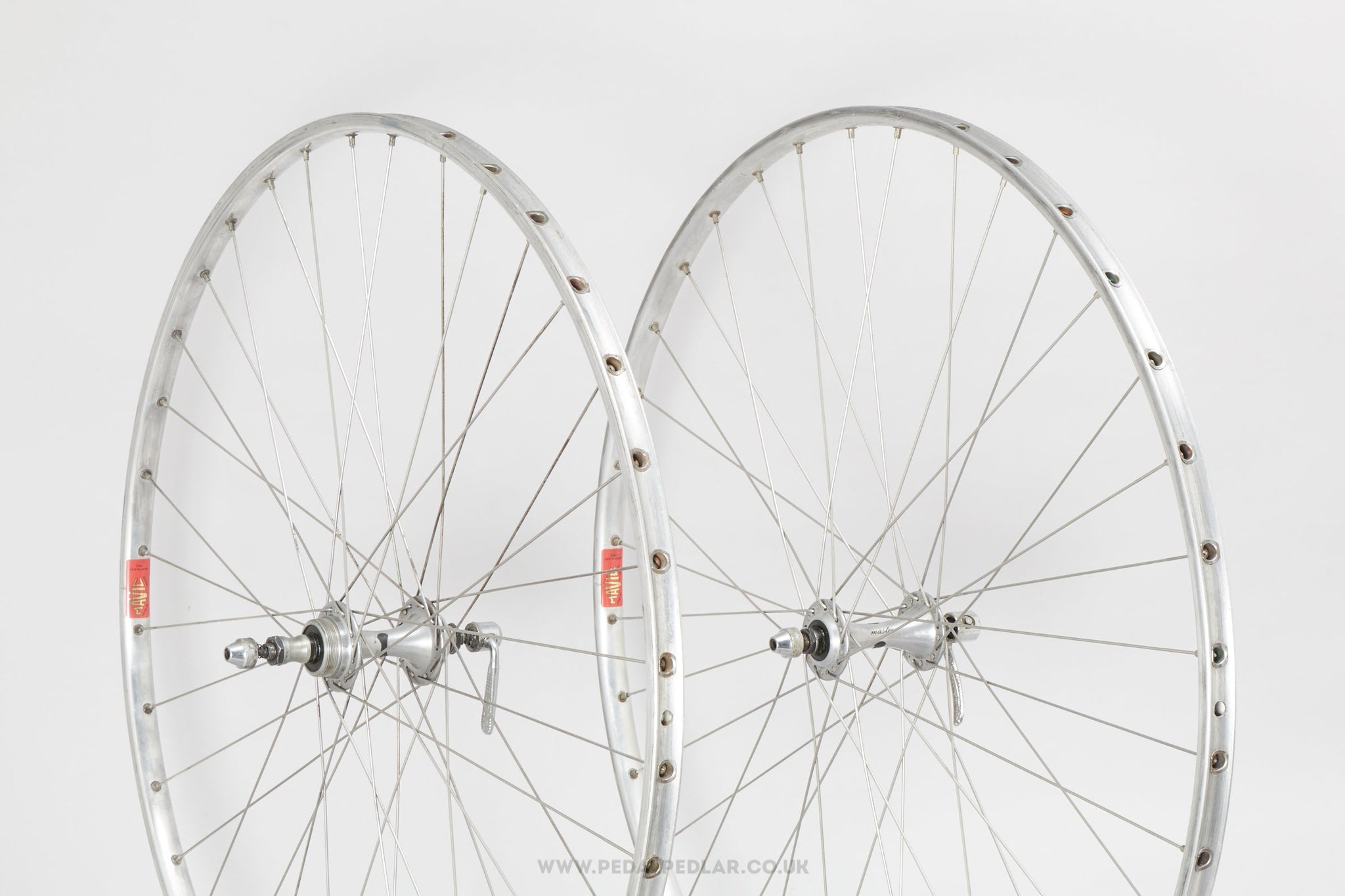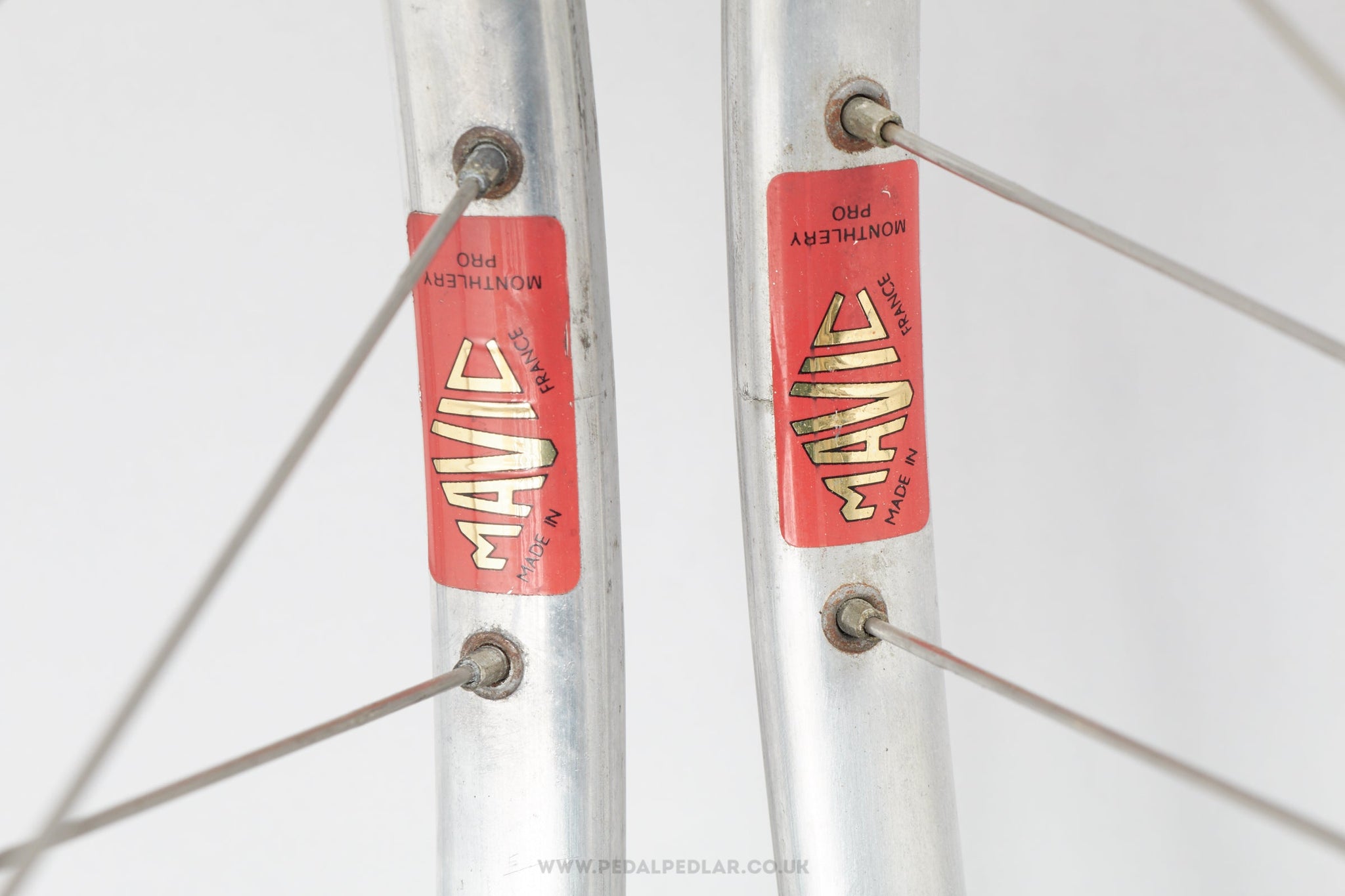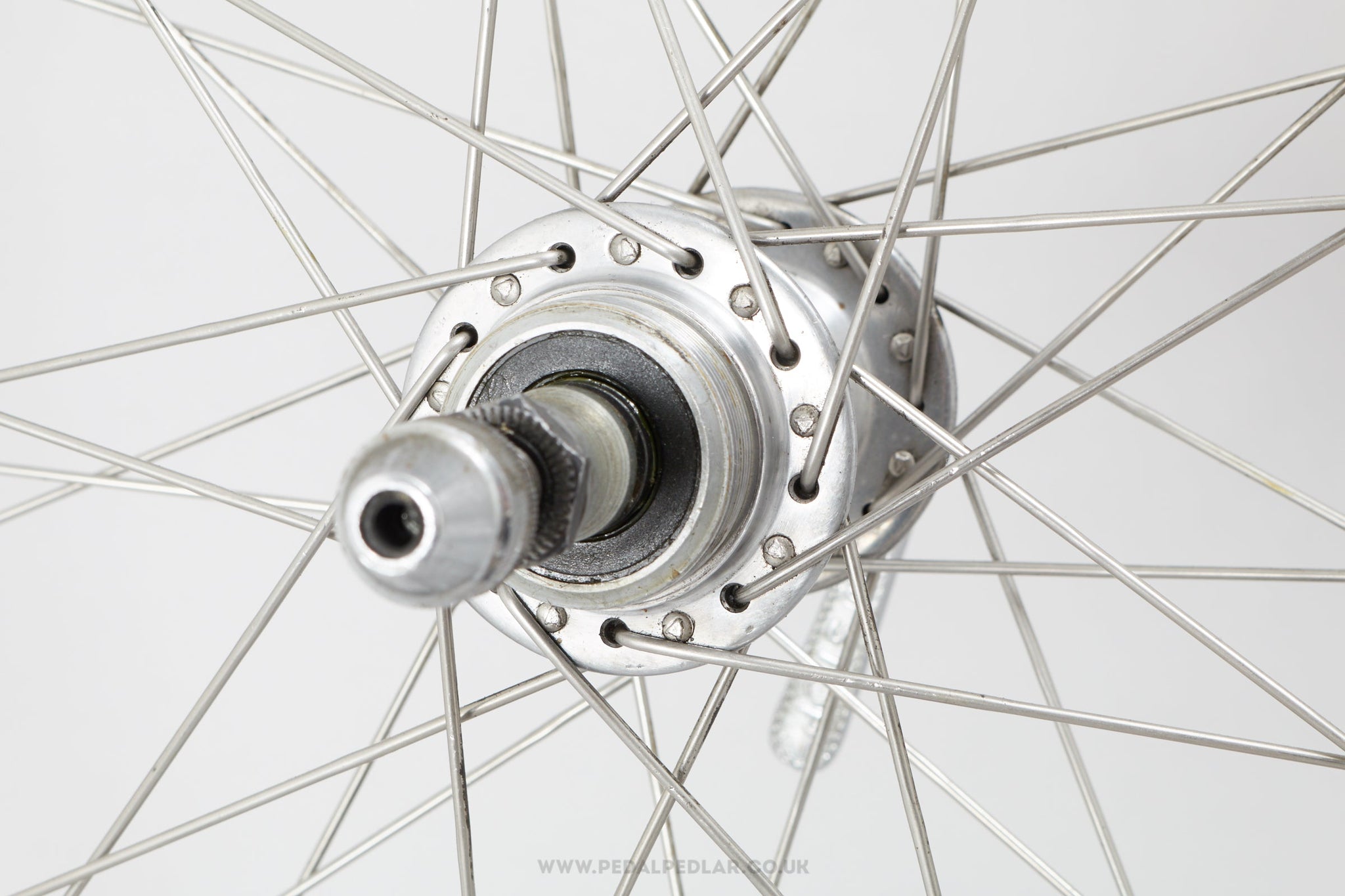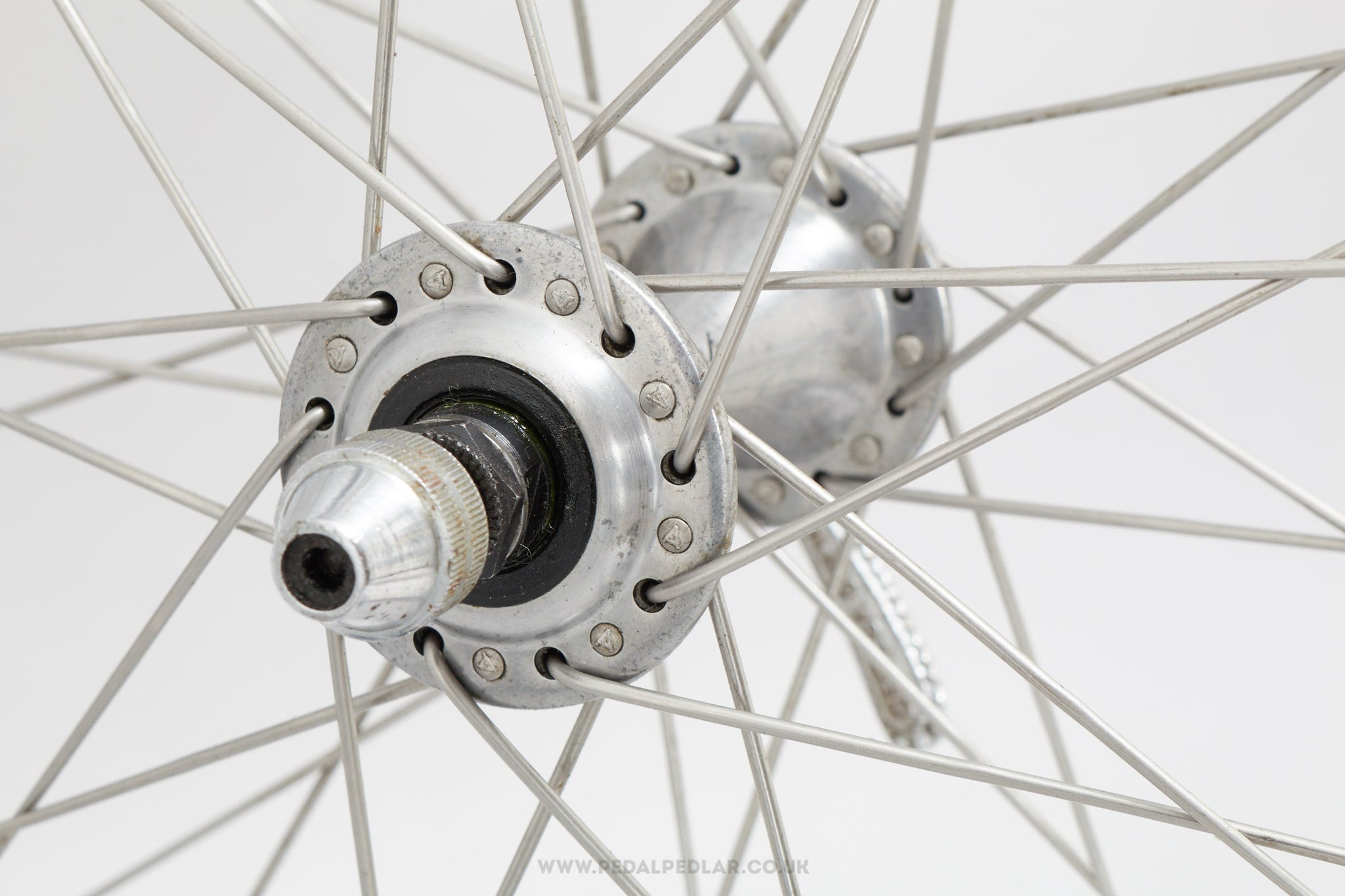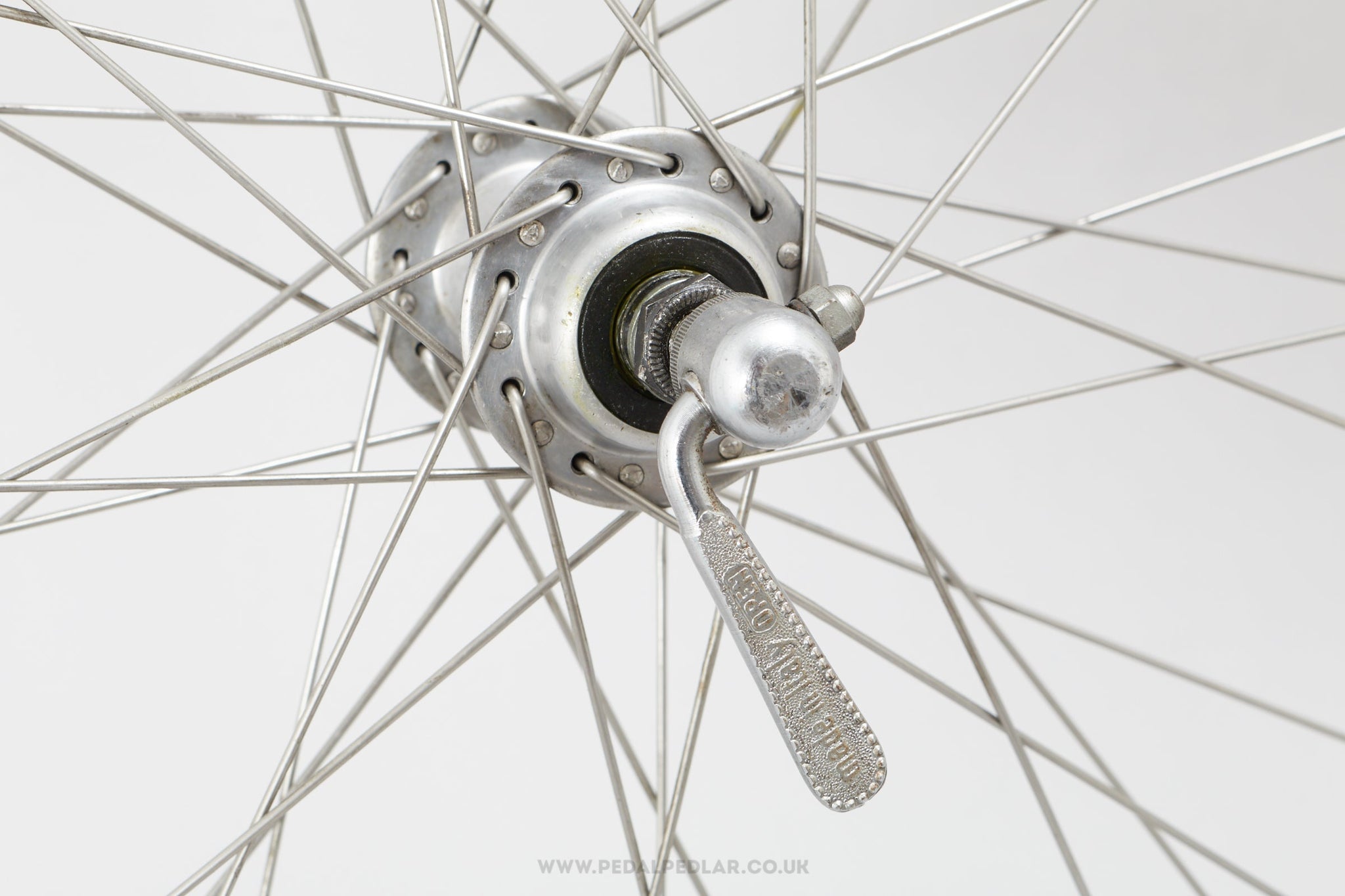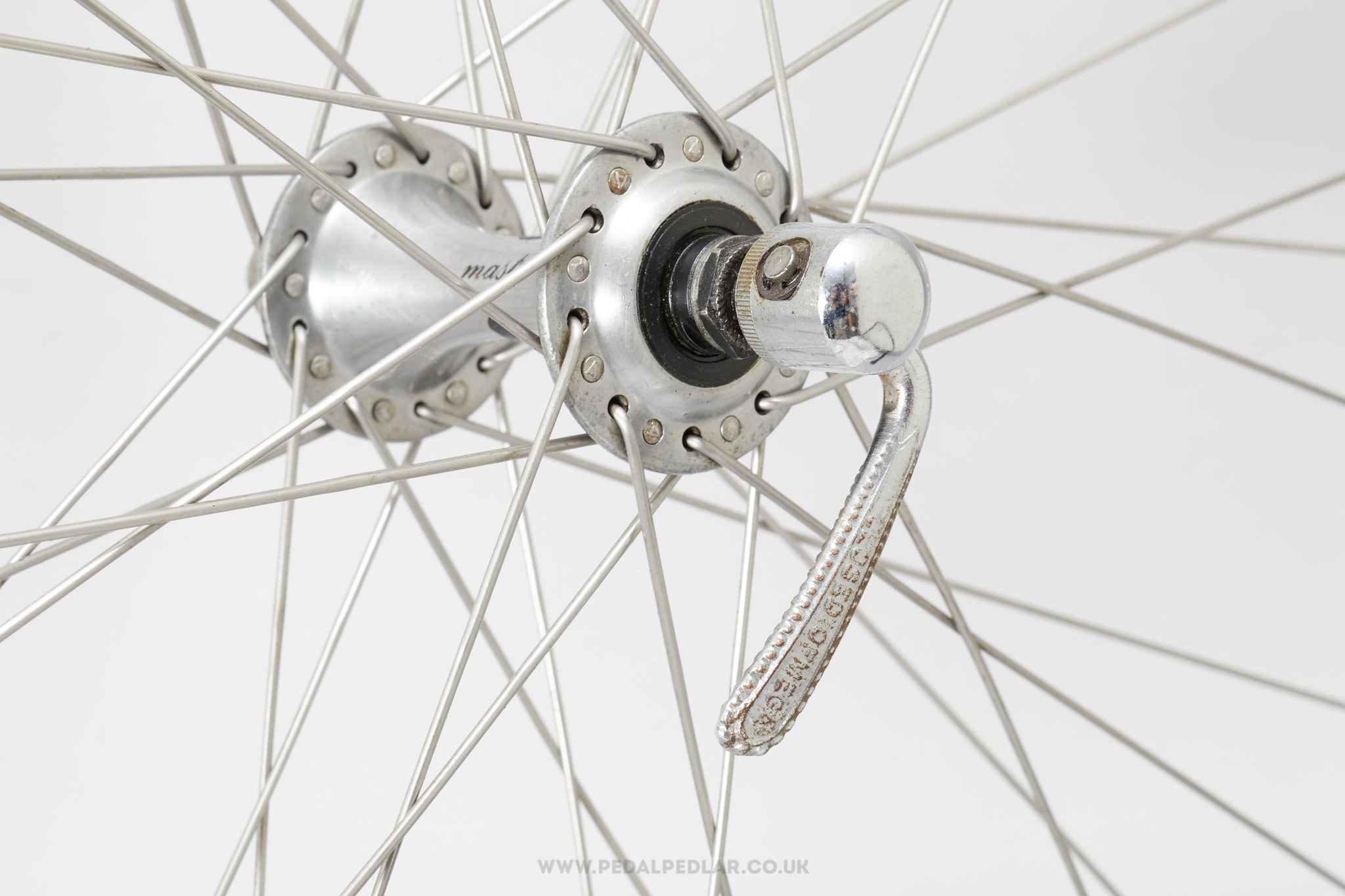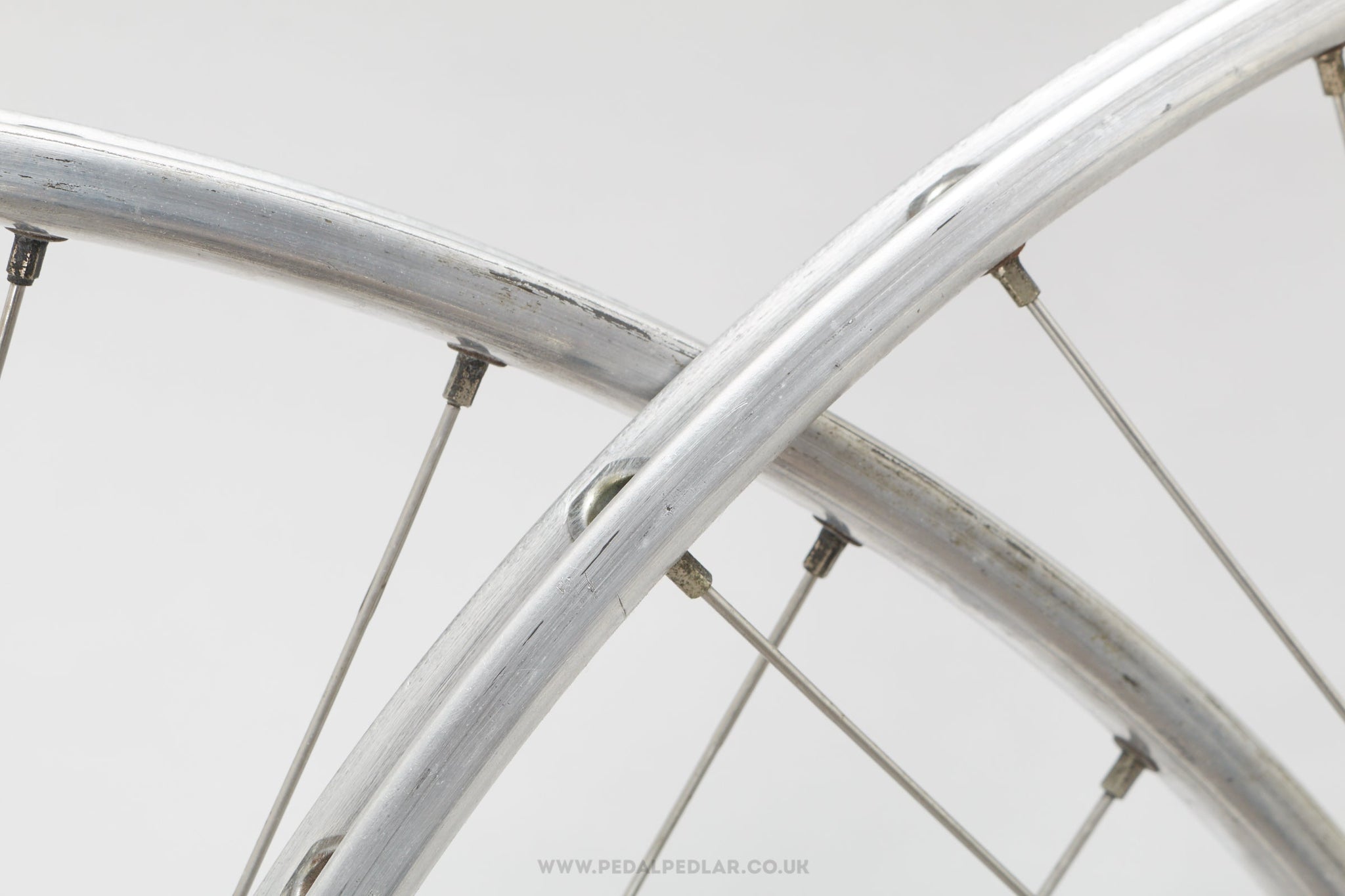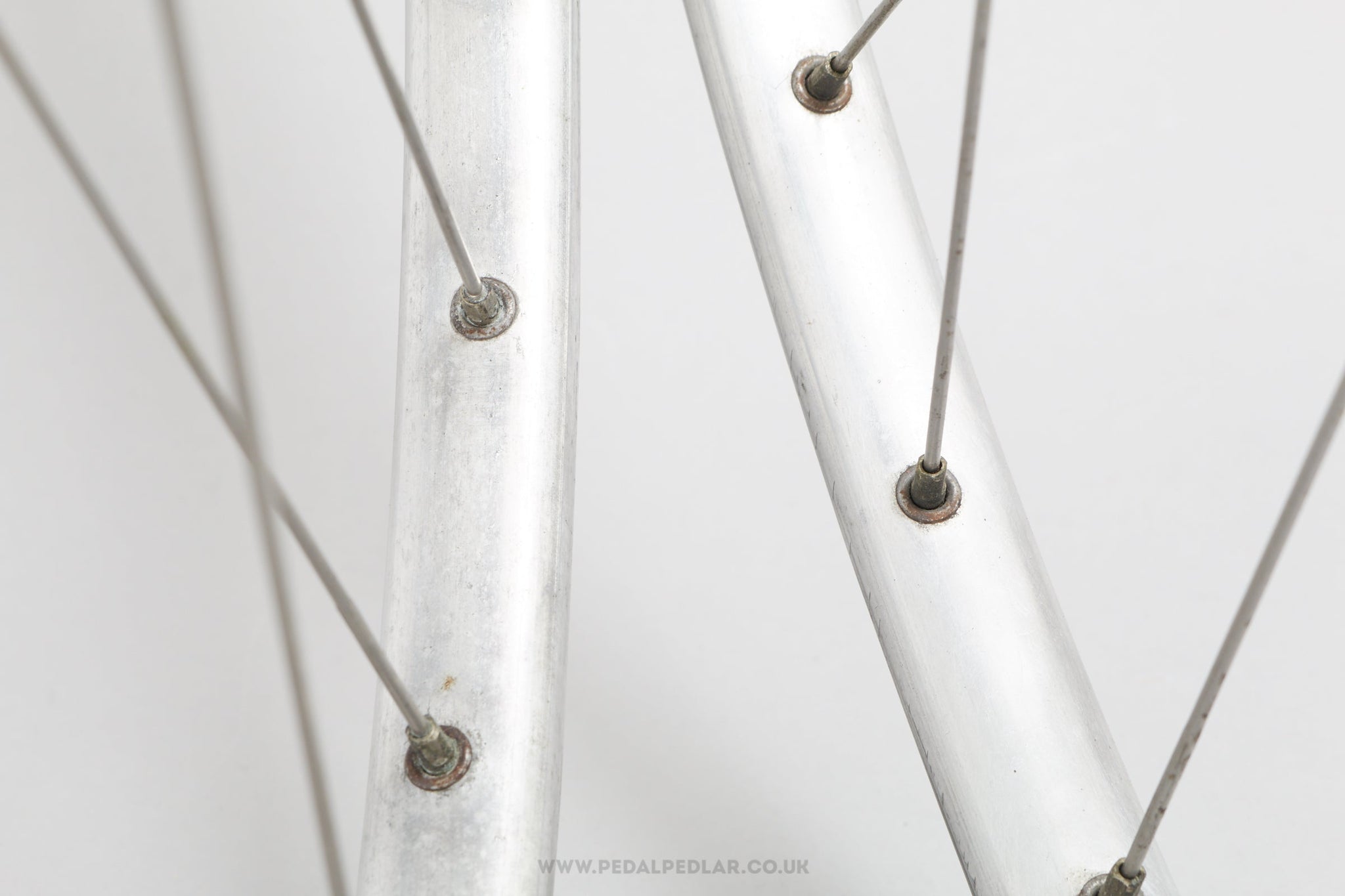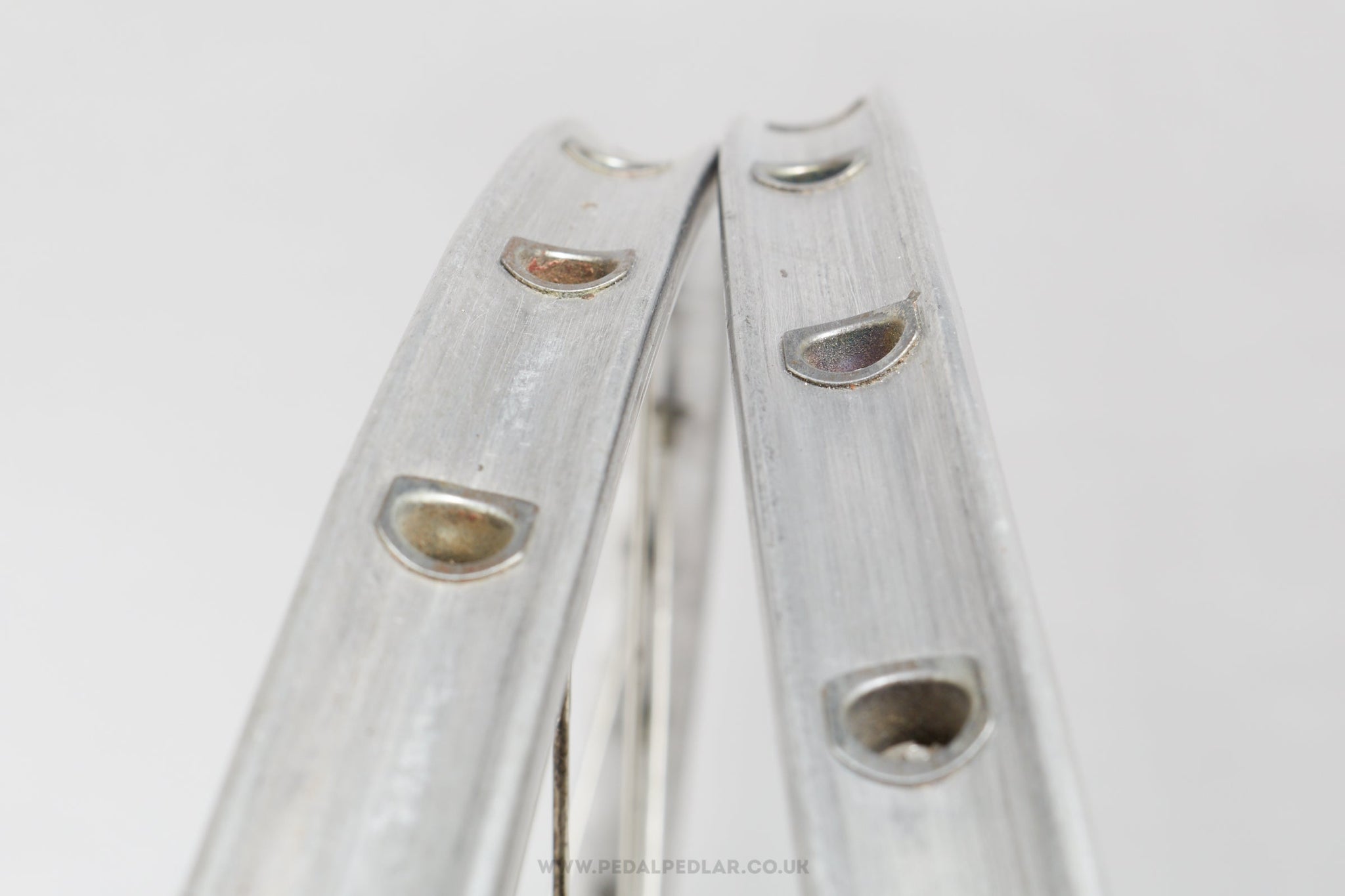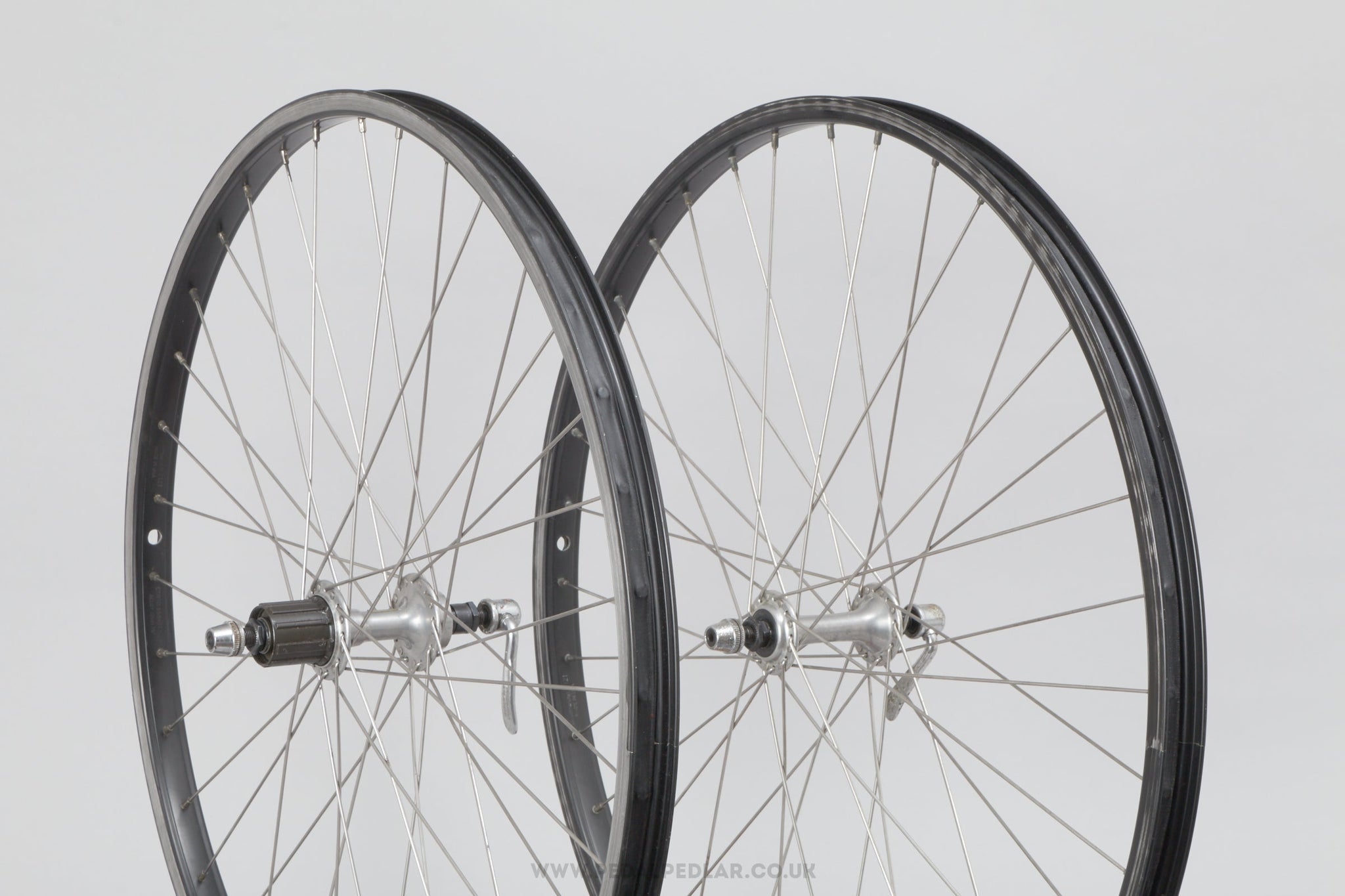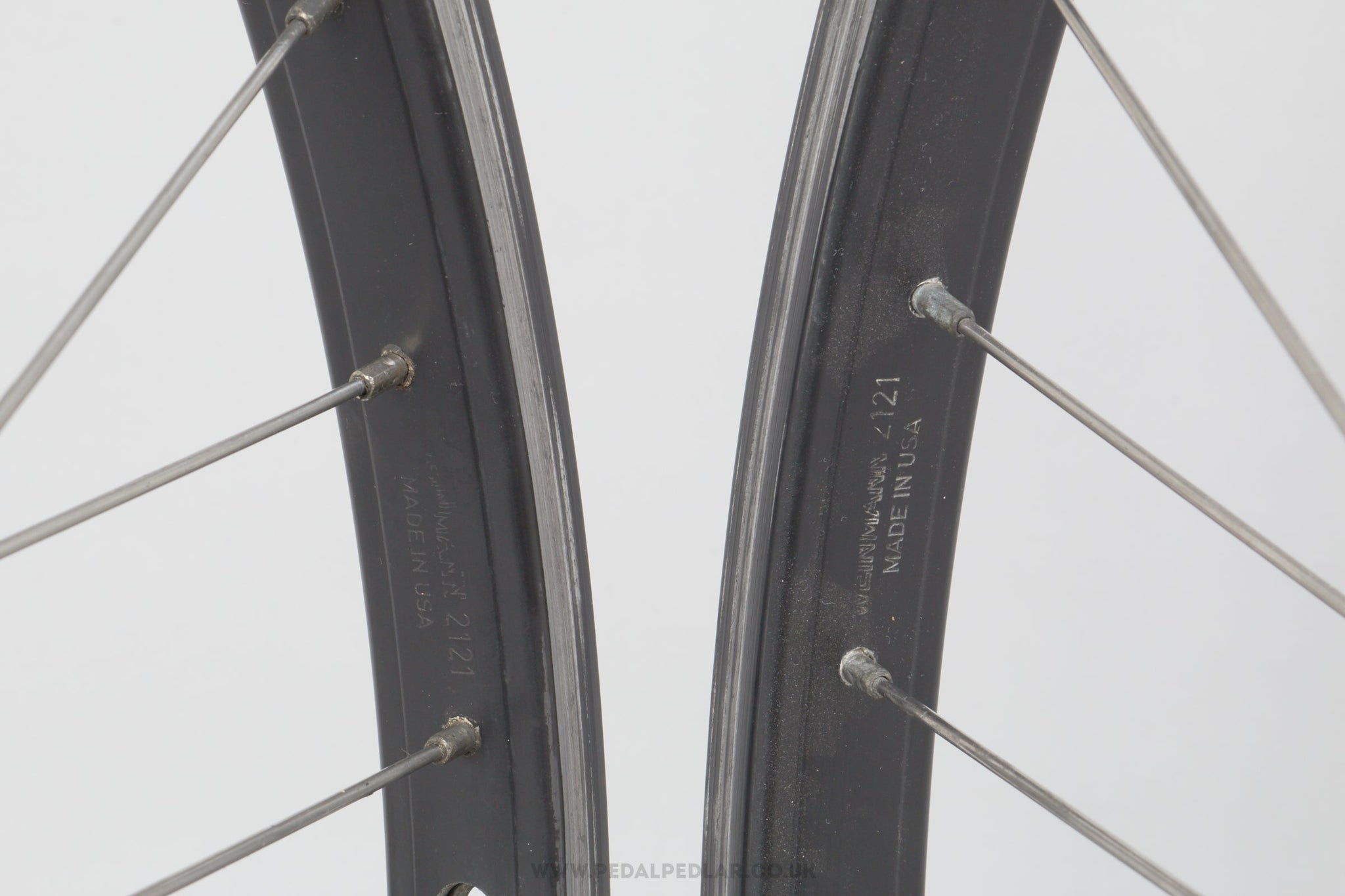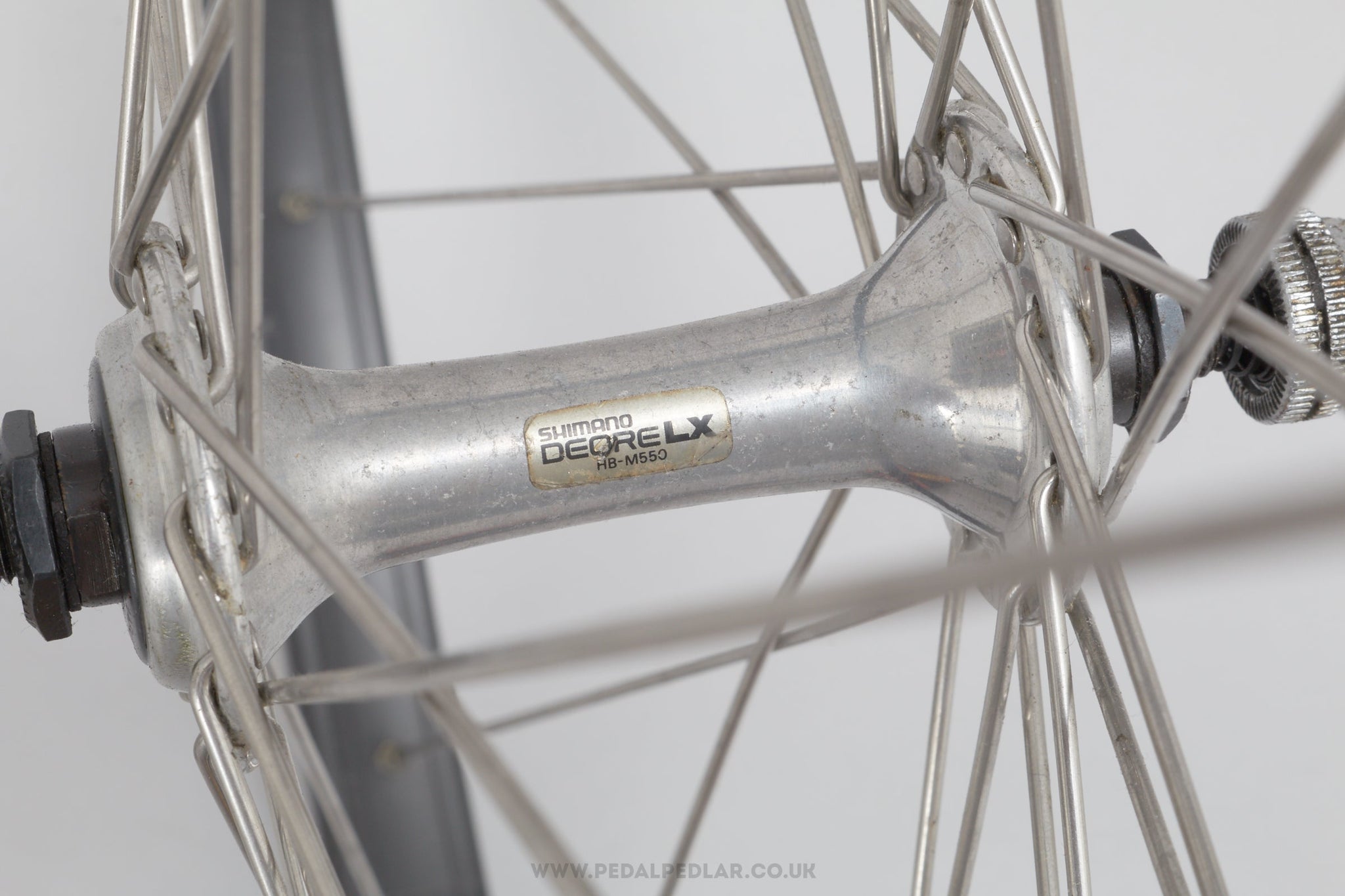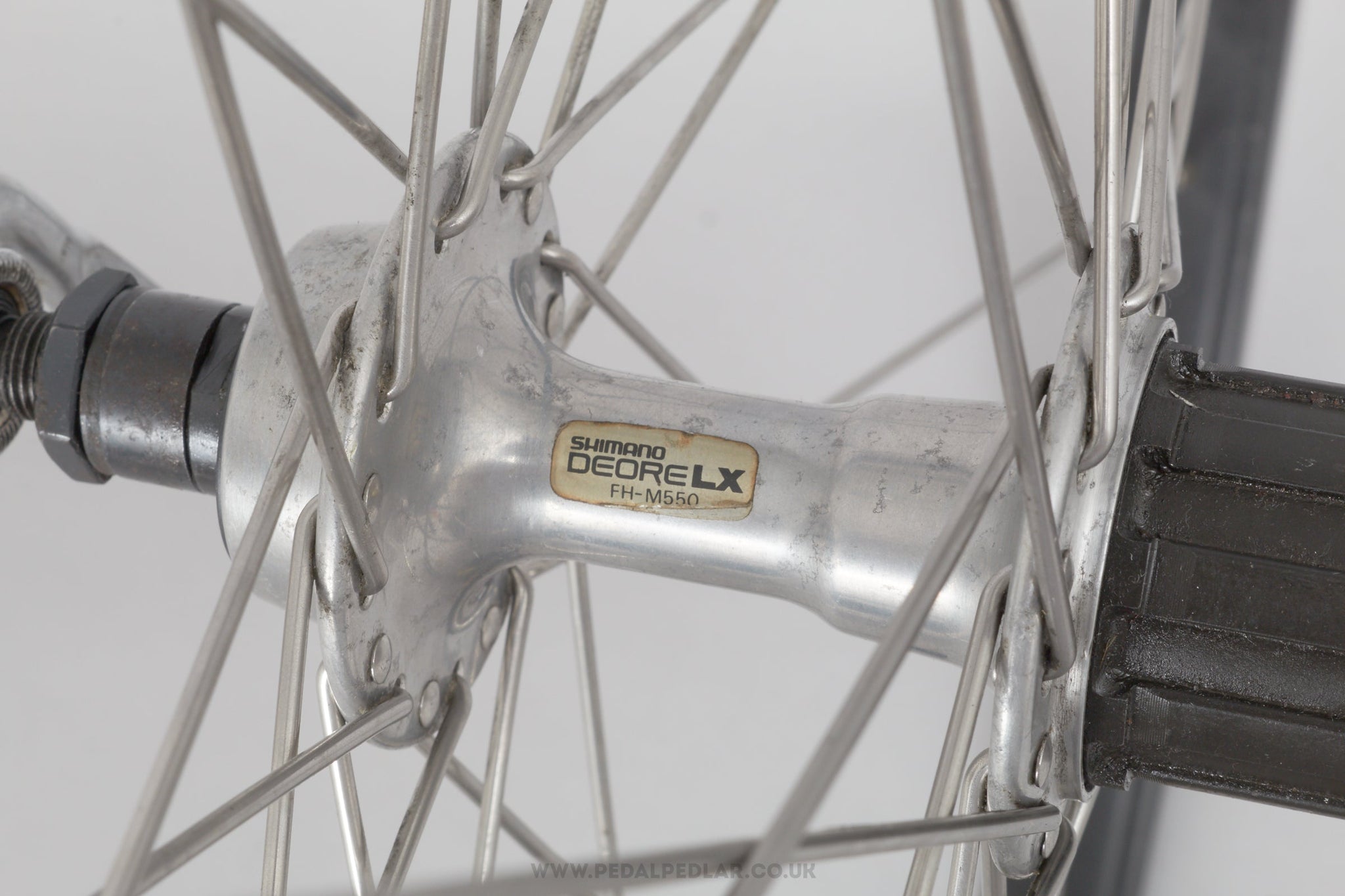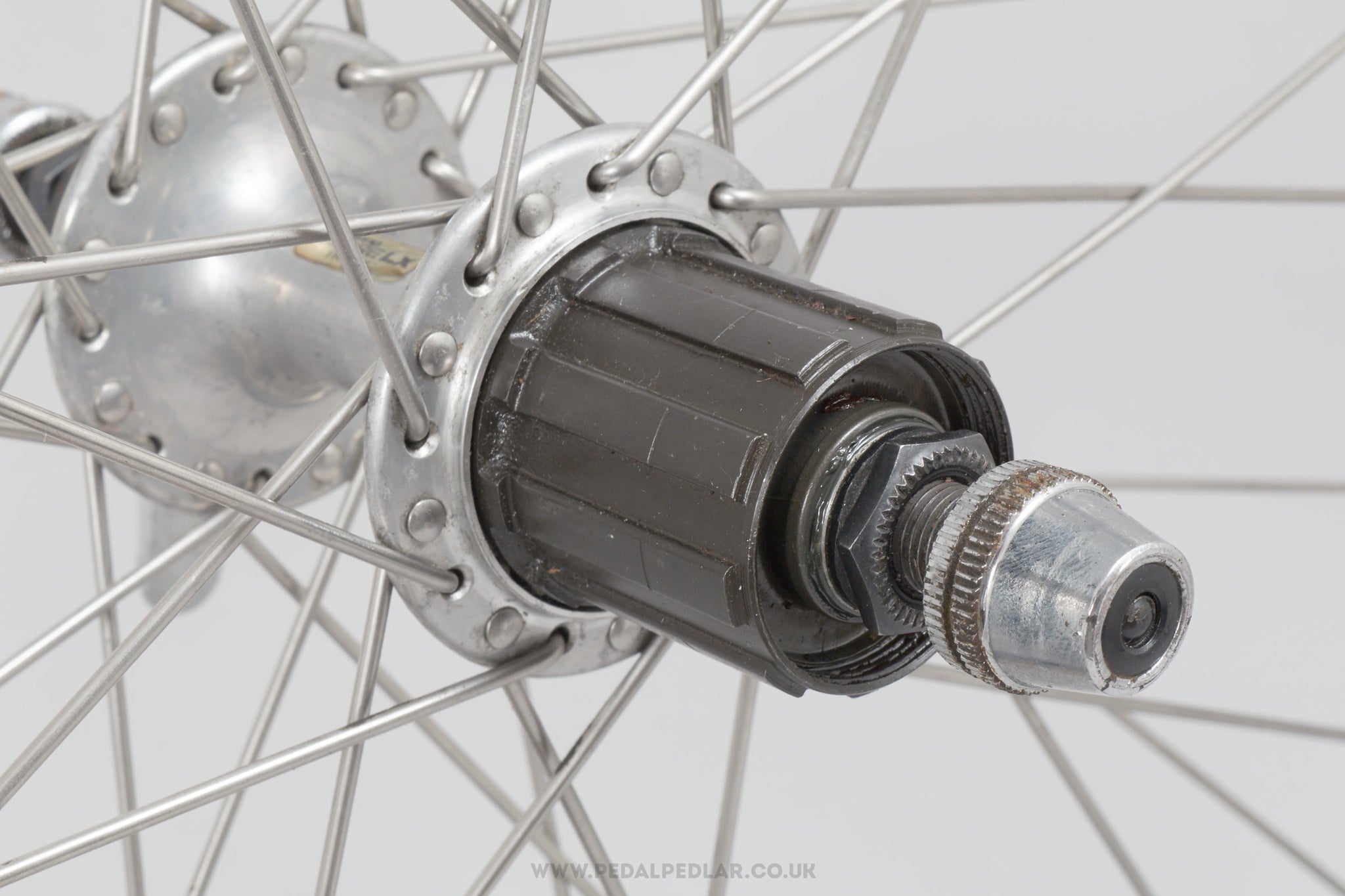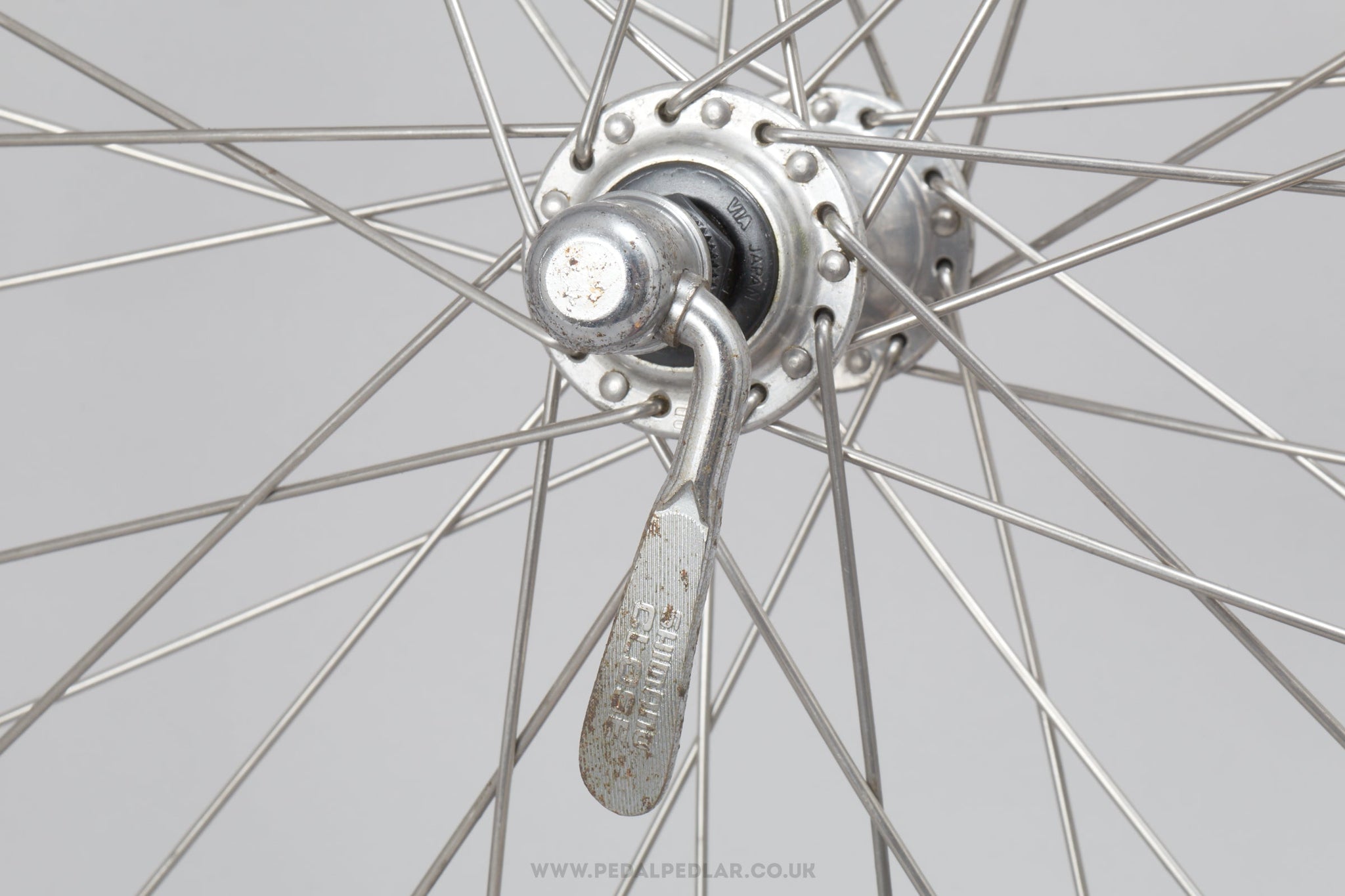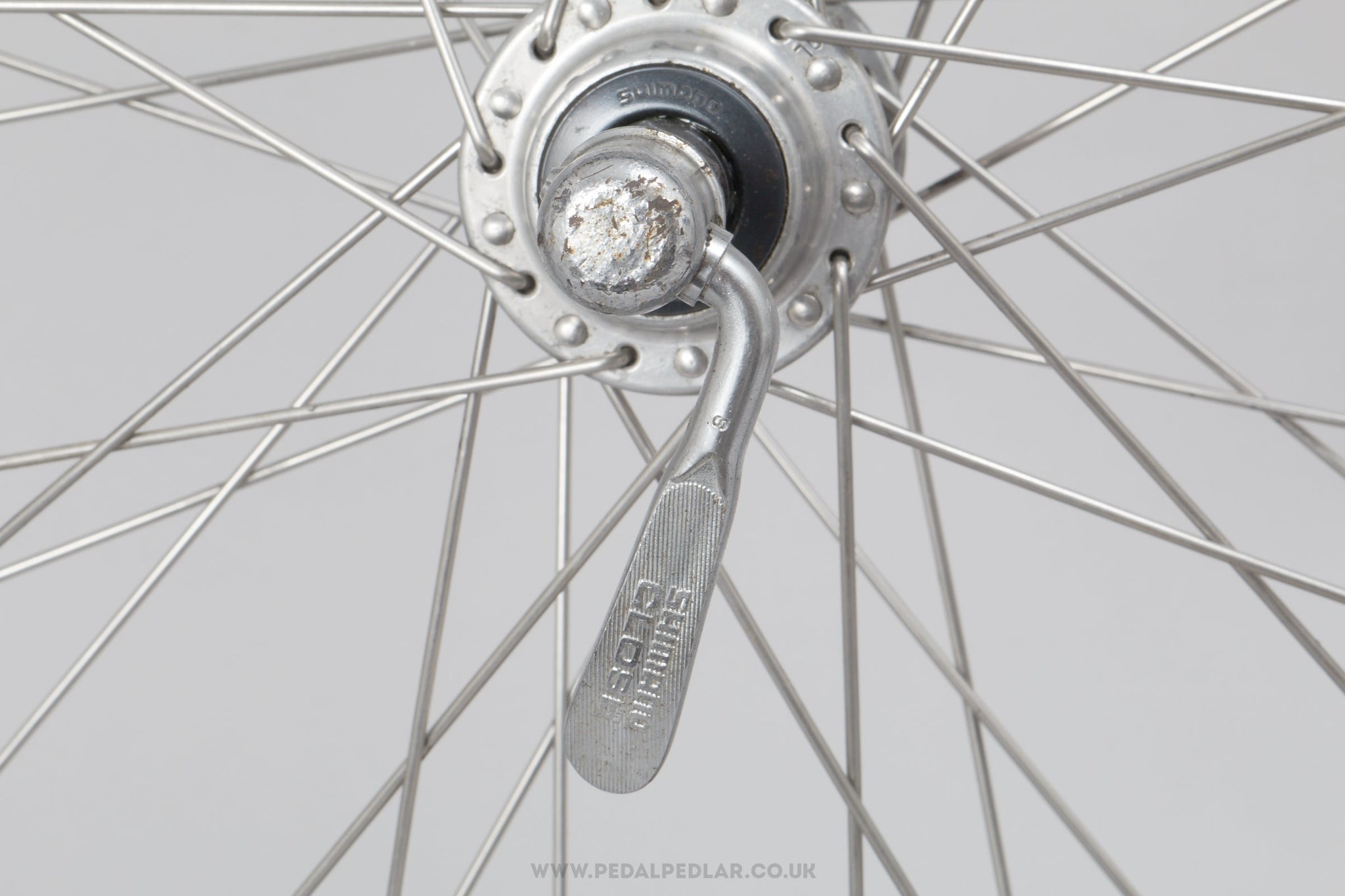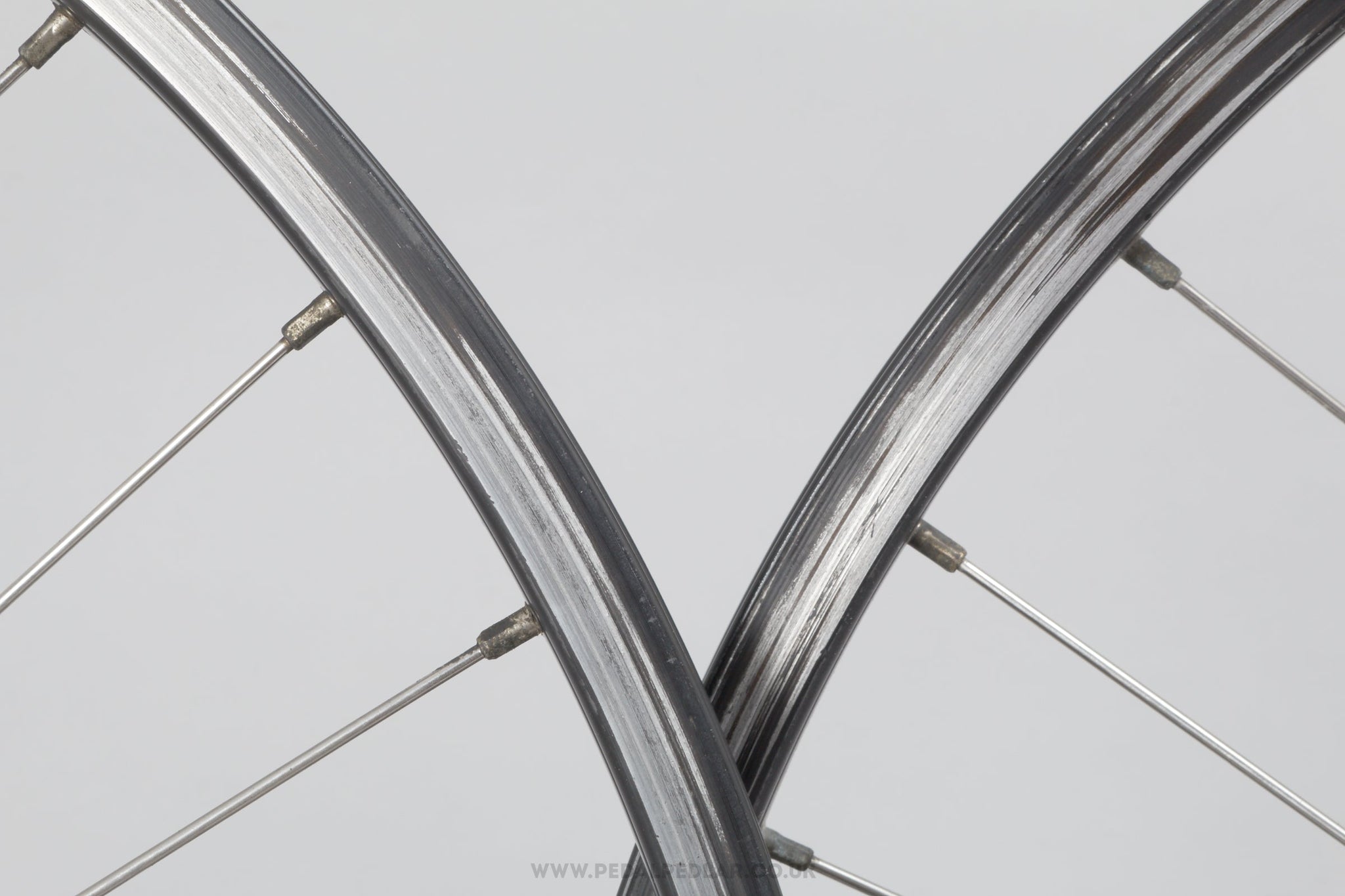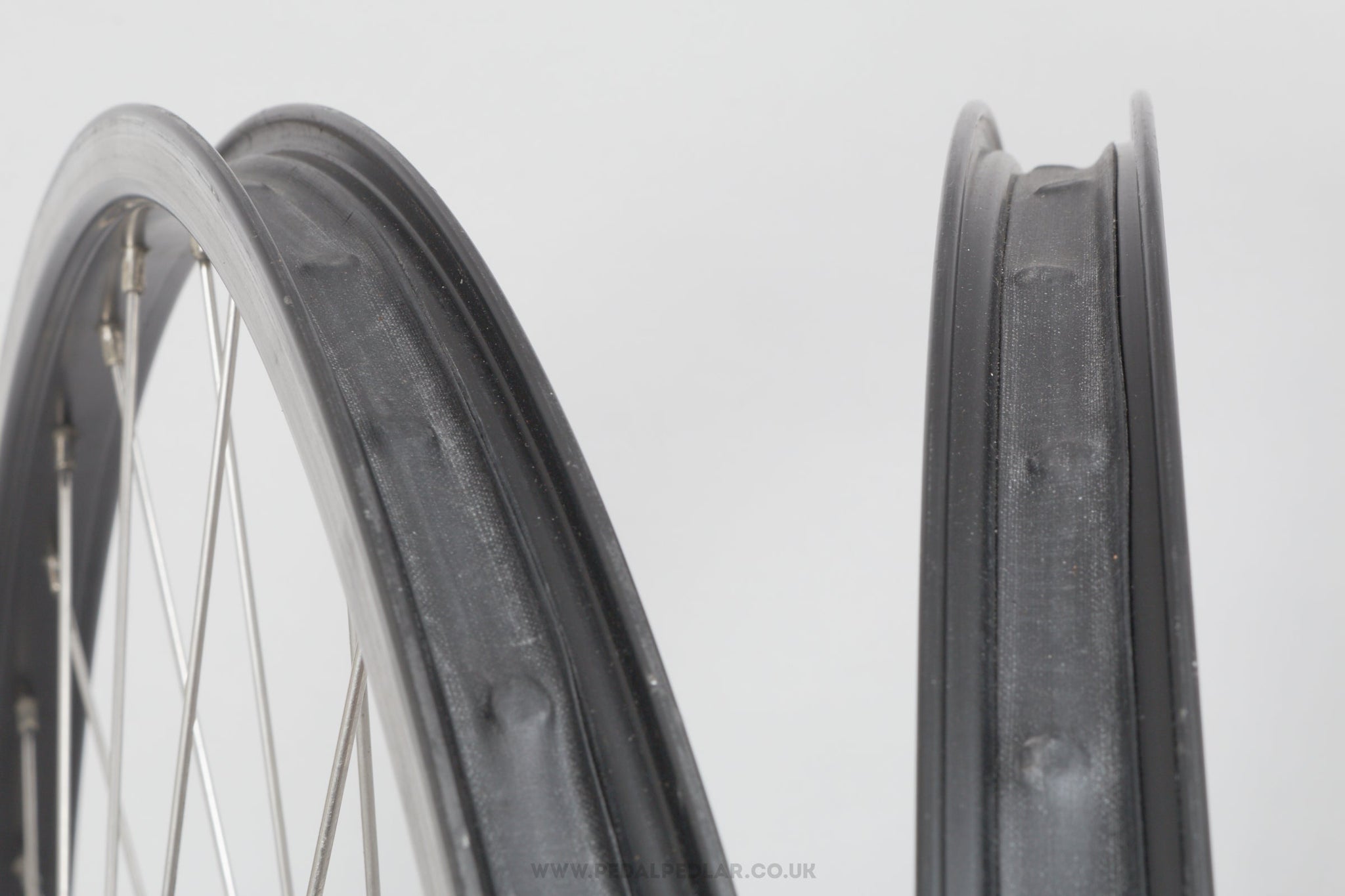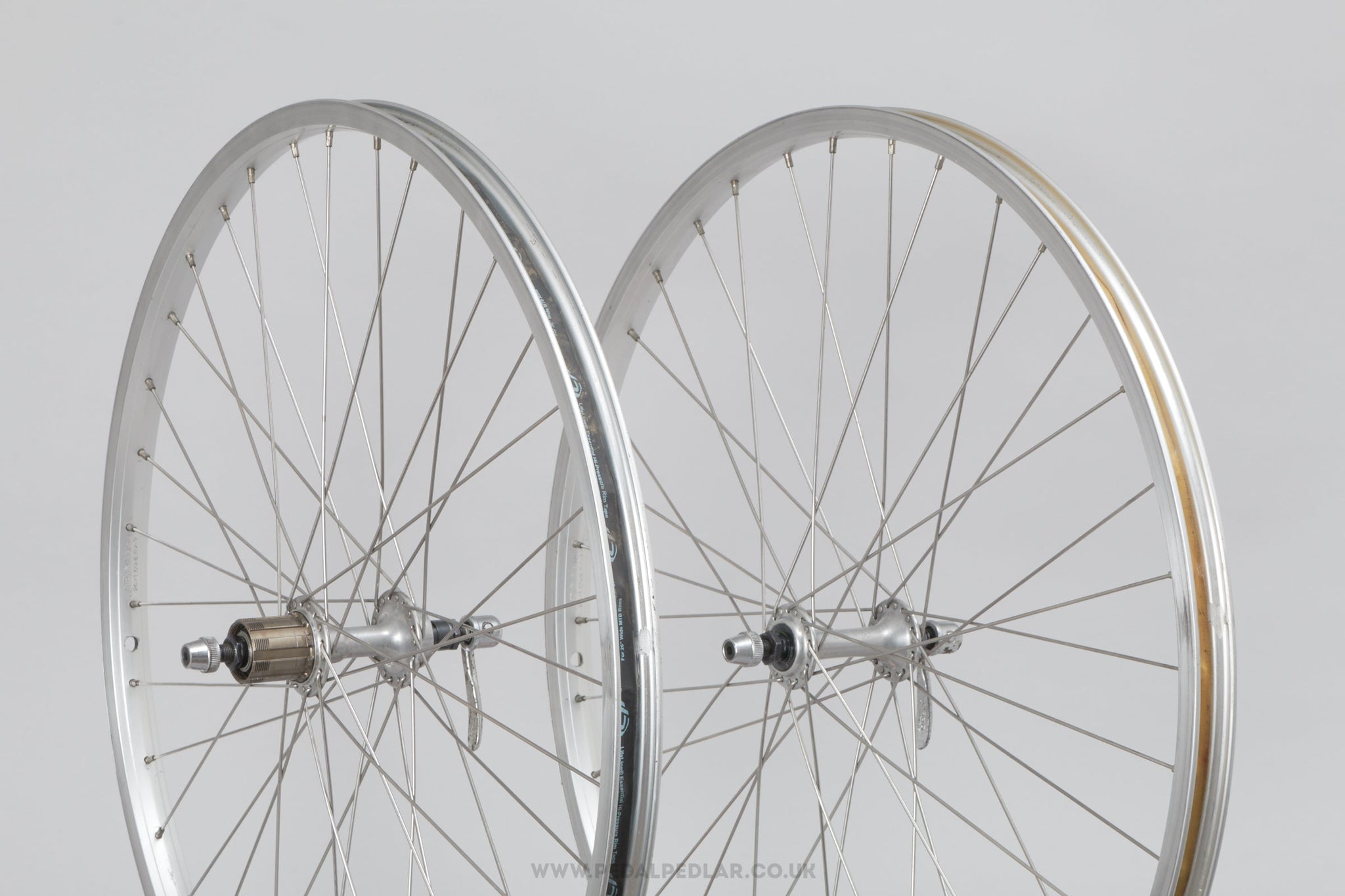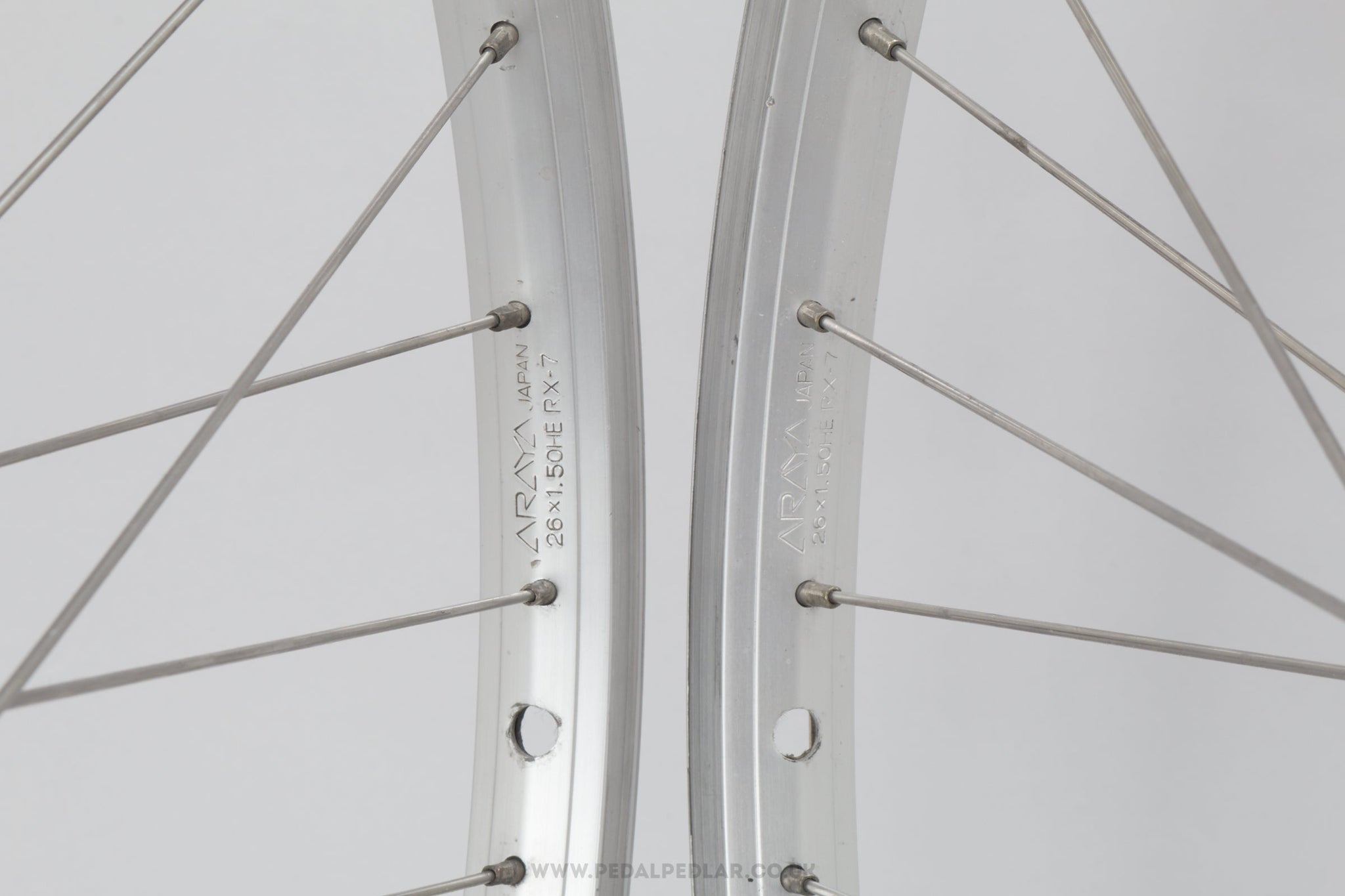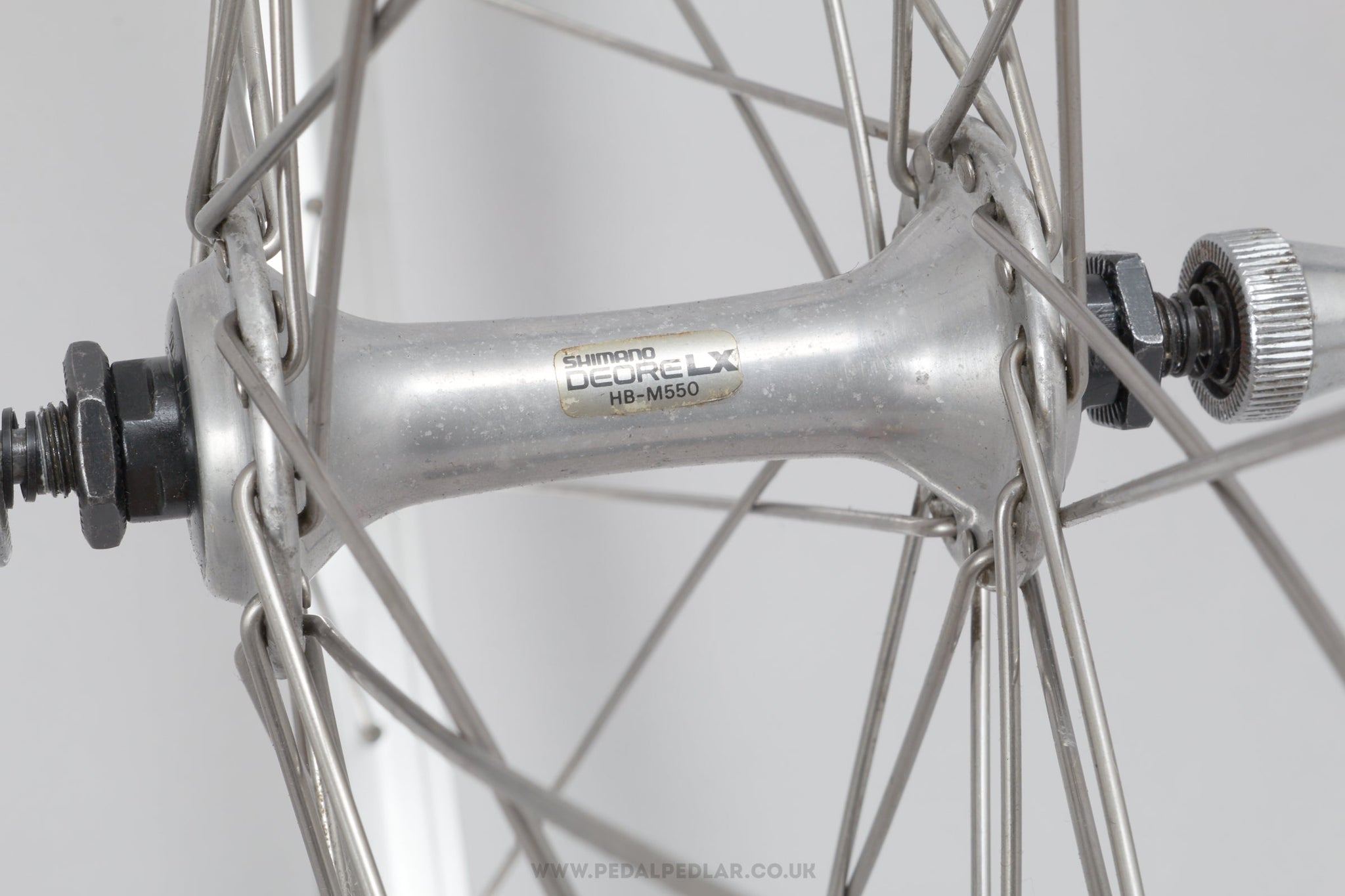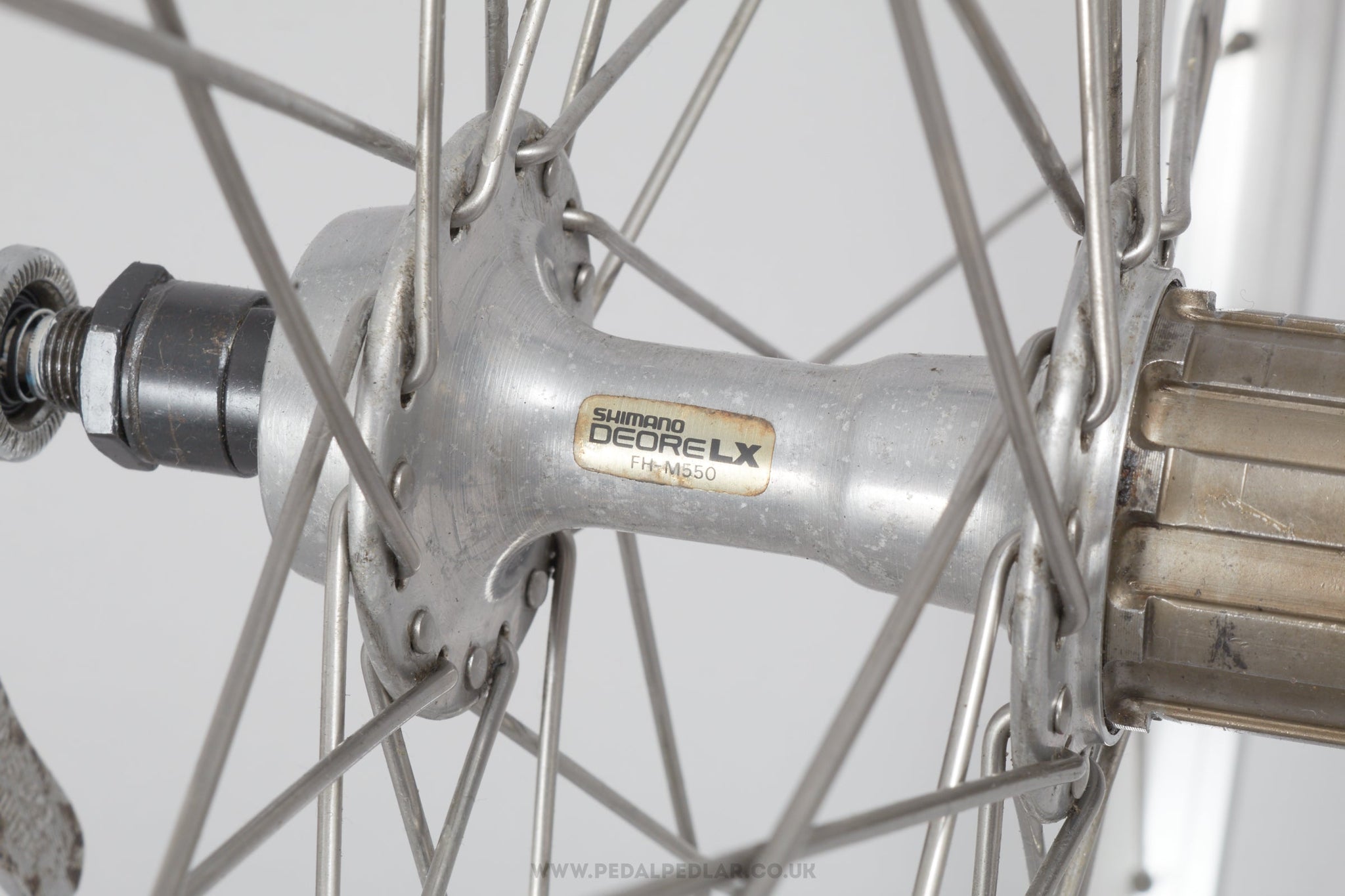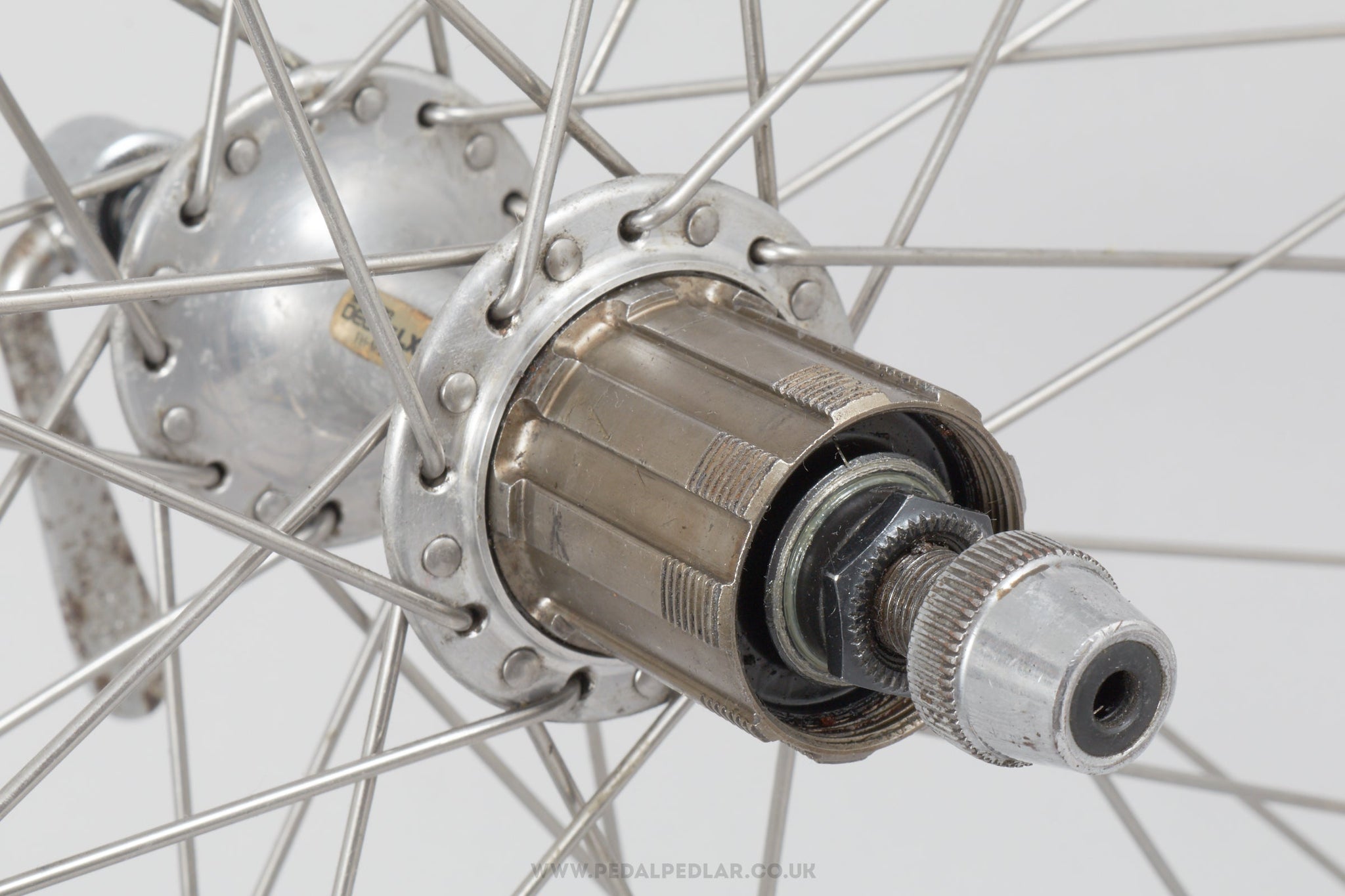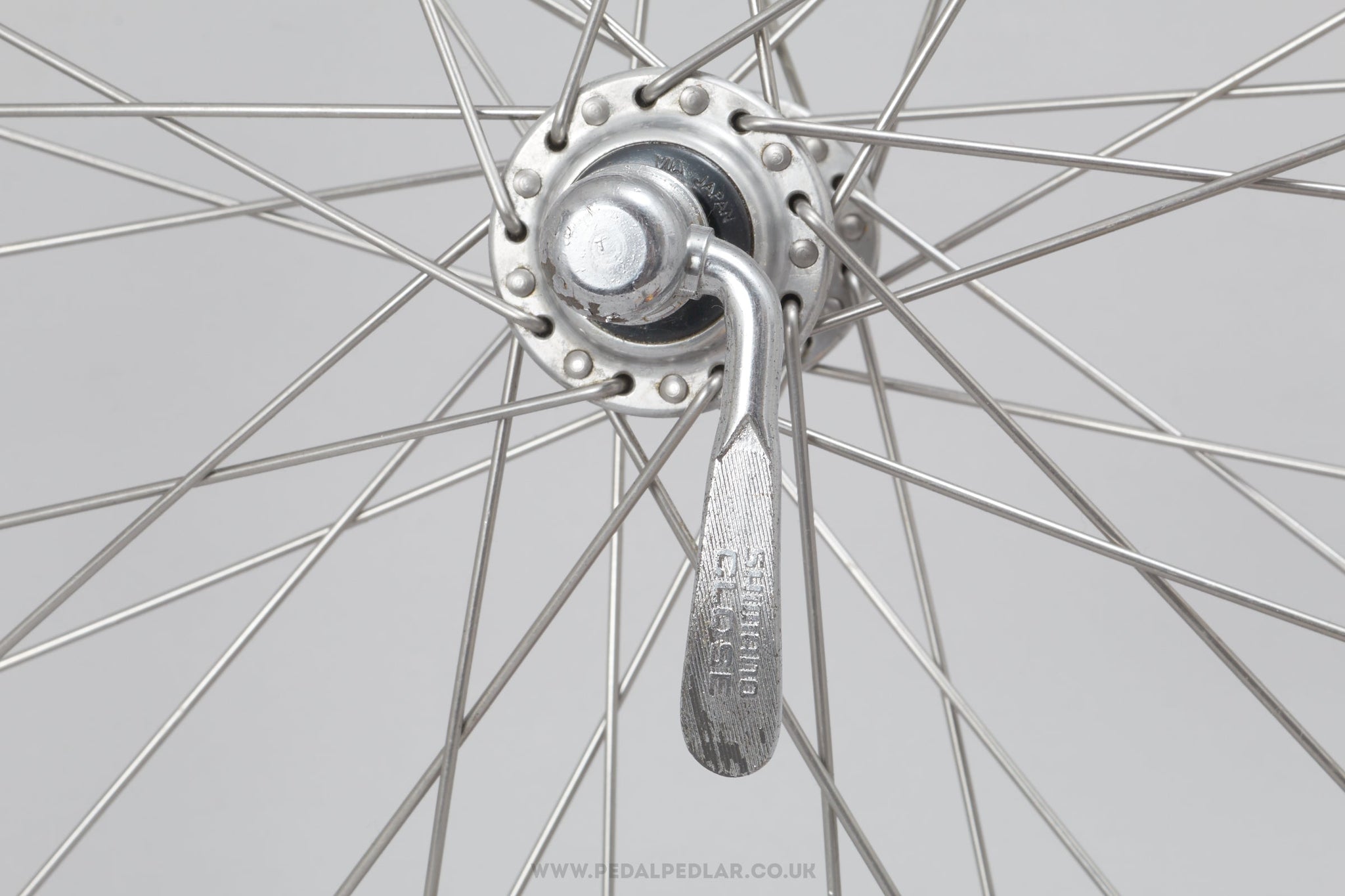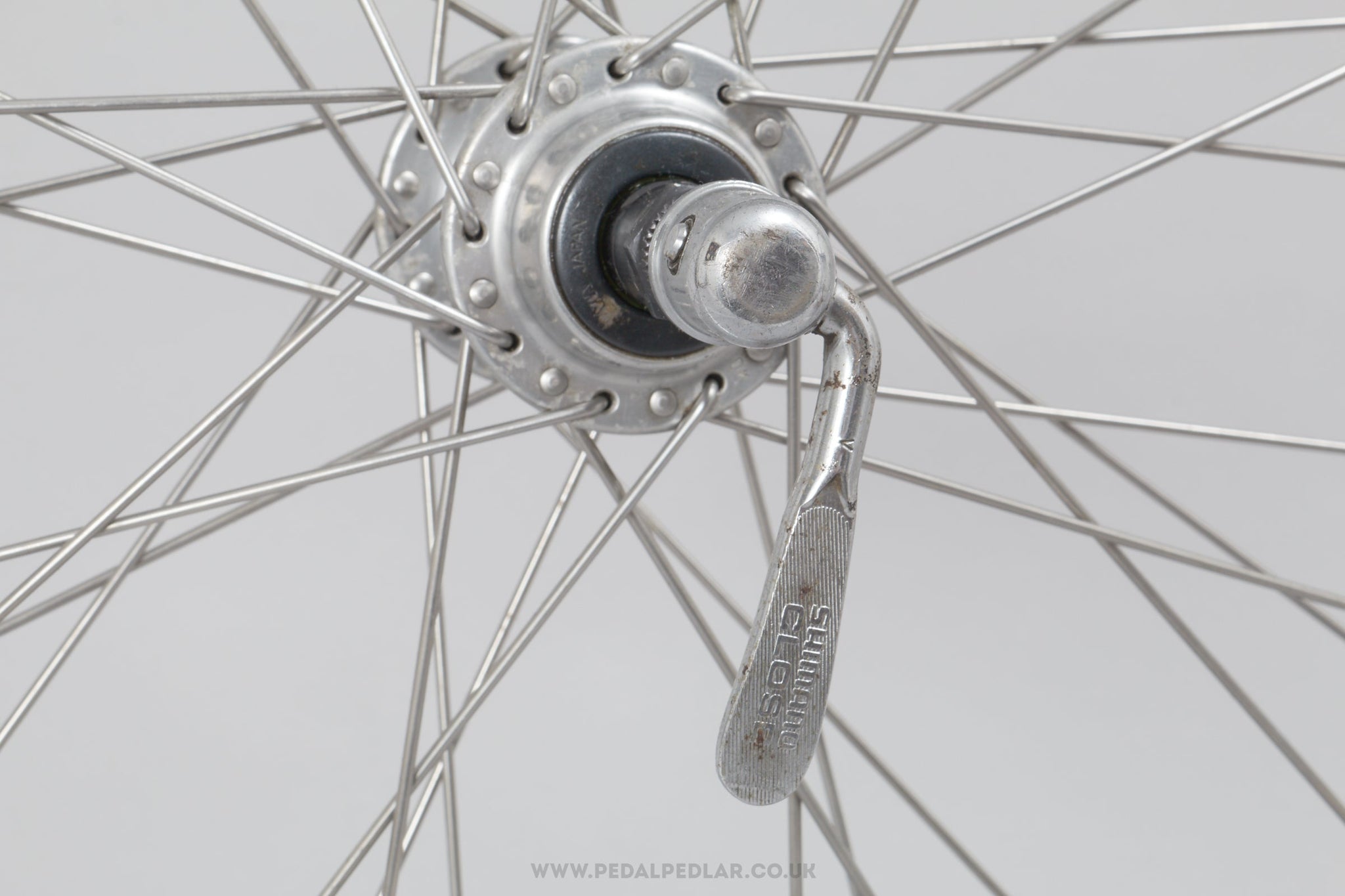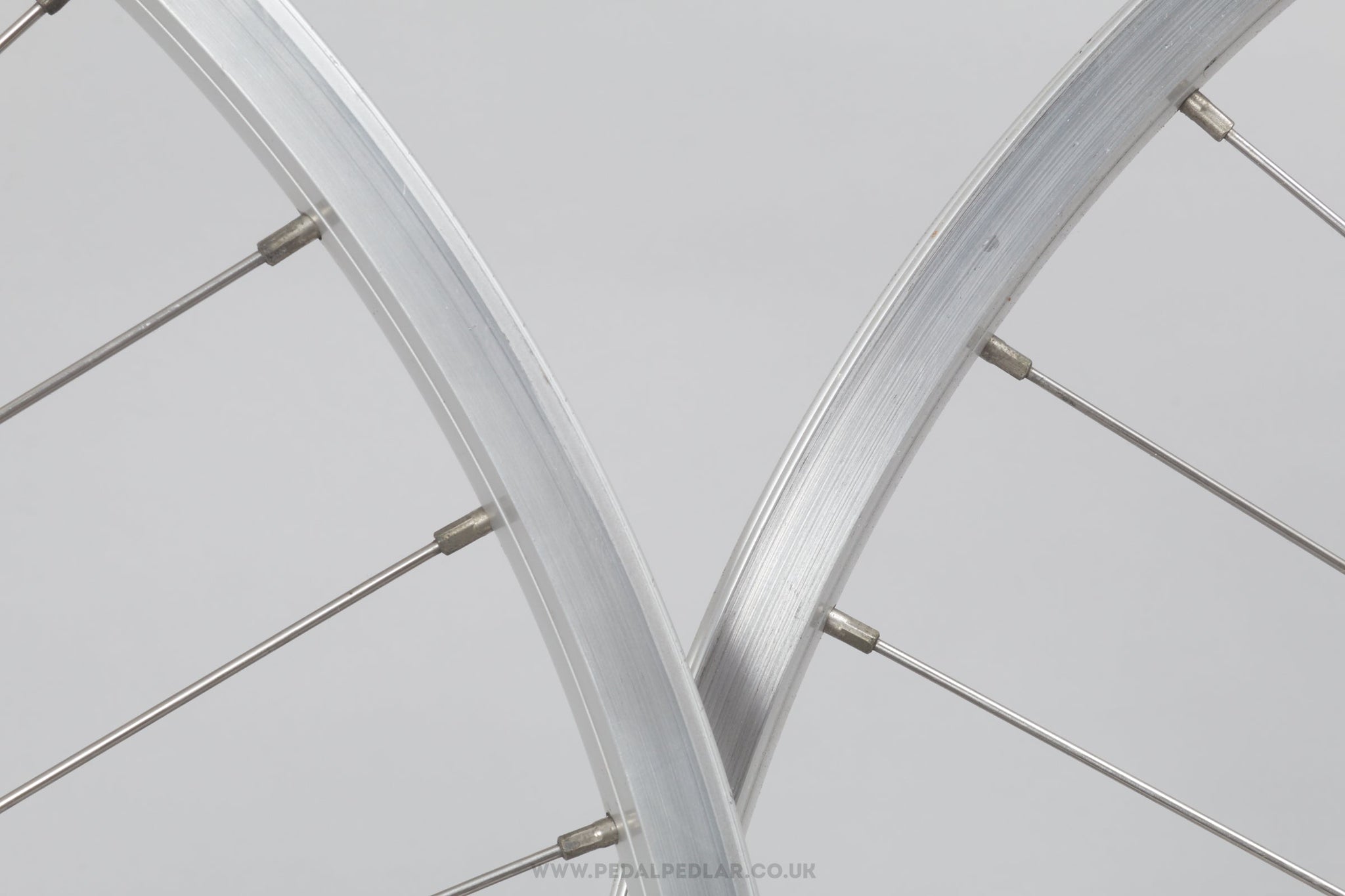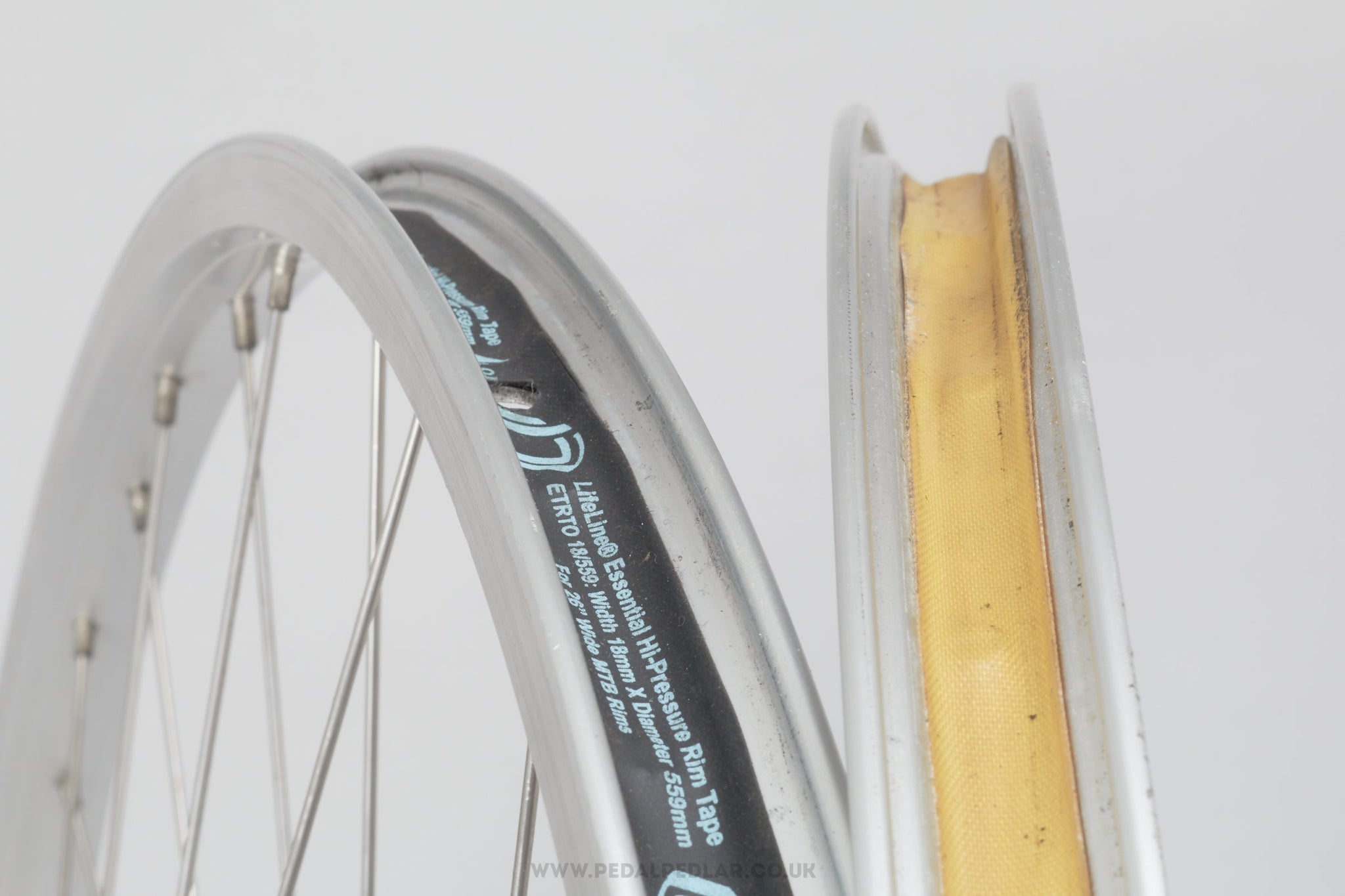- Sale
- Frames
- Wheels
-
Parts
- Drivetrain & Gearing
- Downtube Shifters
- Bar Shifters
- Shift/Brake Levers
- Front Derailleurs
- Rear Derailleurs
- Chainsets
- Crank Arms
- Crank Parts
- Bottom Brackets
- Bottom Bracket Parts
- Chainrings
- Freewheels
- Cassettes
- Chains
- Gear Parts
- Braking
- Brake Sets
- Brake Calipers
- Brake Cantilevers
- Brake Levers
- Brake Parts
- Clothing
- Accessories
- Journal
test
Refine
view allProduct Type
Campagnolo Nuovo/Super Record (1034) / Unbranded Vintage 28"/700c Tubular Road Wheels
£232.50 £310.00
✓ Original vintage wheels - in production from the 1970s to the 1980s
✓ Super lightweight for the era - only 1.8 kg (for the pair)!
✓ Suitable for historic cycling events such as L'Eroica
✓ Professionally checked & serviced
✓ Worldwide shipping
Campagnolo Nuovo/Super Record wheels built with Unbranded rims, the hubs hailing from Italy and in production from the 1970s to the 1980s. Made from aluminium/steel and weighing in at 1.8 kg - incredibly lightweight for a pair of wheels at that time. A fine choice for keeping your vintage bike authentic, but also great for any other compatible bike too.
If you're taking part in L'Eroica or a similar vintage event, these are fully compliant - so rest assured, the pre-1987 police won't lock you up for having the wrong wheels!
The wheels have been serviced, checked by one of our mechanics and graded as good condition, but do take a good look at the detailed photos so you can see the cosmetic condition before you buy.OVERVIEW
Rim Condition - Good
Model ID - 1034
Production Era - 1970s & 1980s
Country - Italian
Material - Aluminium/Steel
Weight - 1.835 kg
Stock Code - U-W-PR27V
TECHNICAL INFO
Rim Size - 28"/700c Tubular
Bike Type - Road
Drilling (F/R) - 32/32 Hole
Spacing (O.L.D.) F/R - 100 mm / 126 mm
Speed - 5 Speed, 6 Speed, 7 Speed
Sprocket Fitting - Screw-On (Italian 1.378 x 24 TPI)
-
▼SHIPPING, TAXES & RETURNS
-
We've been safely sending orders around the world since 2010. There's a handy shipping calculator on the shopping cart page so you can see the cost of postage as soon as you've added it to your basket. Your order will be carefully packed and sent with tracking & insurance, we despatch most orders within 2-3 days but larger items and orders placed before the weekend can take an extra day or two to process.
We accept returns, please notify us within 14 days and ensure the item arrives back with us no later than 30 days after the order was received.
EU Customers – for orders under €150 (excluding shipping), VAT will be collected at checkout – no extra import fees to pay on delivery! For orders over €150 any import fees will be payable to the carrier before delivery.
USA Customers – import fees are now collected at checkout for all orders to the US, so there won’t be any surprise charges when your order arrives.
Other International Customers – local import fees may still apply, charged by your customs office or courier before delivery. These are not collected by us, so please check your local rates before purchasing.
Any applicable fees will appear at checkout.
Ofmega Master / Mavic Monthlery Pro Vintage 28"/700c Tubular Road Wheels
£210.00 £280.00
✓ Original vintage wheels - produced in the 1970s
✓ Lightweight for the era - just 1.9 kg (for the pair)
✓ Suitable for historic cycling events such as L'Eroica
✓ Professionally checked & serviced
✓ Worldwide shipping
Ofmega Master wheels built with Mavic Monthlery Pro rims, the hubs hailing from Italy and in production during the 1970s. Made from aluminium/steel and weighing in at 1.9 kg - pretty lightweight for a pair of wheels at that time. A fine choice for keeping your vintage bike authentic, but also great for any other compatible bike too.
If you're taking part in L'Eroica or a similar vintage event, these are fully compliant - so rest assured, the pre-1987 police won't lock you up for having the wrong wheels!
The wheels have been serviced, checked by one of our mechanics and graded as good condition, but do take a good look at the detailed photos so you can see the cosmetic condition before you buy.OVERVIEW
Rim Condition - Good
Production Era - 1970s
Country - Italian
Material - Aluminium/Steel
Weight - 1.853 kg
Stock Code - U-W-PR33V
TECHNICAL INFO
Rim Size - 28"/700c Tubular
Bike Type - Road
Drilling (F/R) - 36/36 Hole
Spacing (O.L.D.) F/R - 100 mm / 126 mm
Speed - 5 Speed, 6 Speed, 7 Speed
Sprocket Fitting - Screw On (English/ISO: 1.375 x 24 TPI)
-
▼SHIPPING, TAXES & RETURNS
-
We've been safely sending orders around the world since 2010. There's a handy shipping calculator on the shopping cart page so you can see the cost of postage as soon as you've added it to your basket. Your order will be carefully packed and sent with tracking & insurance, we despatch most orders within 2-3 days but larger items and orders placed before the weekend can take an extra day or two to process.
We accept returns, please notify us within 14 days and ensure the item arrives back with us no later than 30 days after the order was received.
EU Customers – for orders under €150 (excluding shipping), VAT will be collected at checkout – no extra import fees to pay on delivery! For orders over €150 any import fees will be payable to the carrier before delivery.
USA Customers – import fees are now collected at checkout for all orders to the US, so there won’t be any surprise charges when your order arrives.
Other International Customers – local import fees may still apply, charged by your customs office or courier before delivery. These are not collected by us, so please check your local rates before purchasing.
Any applicable fees will appear at checkout.
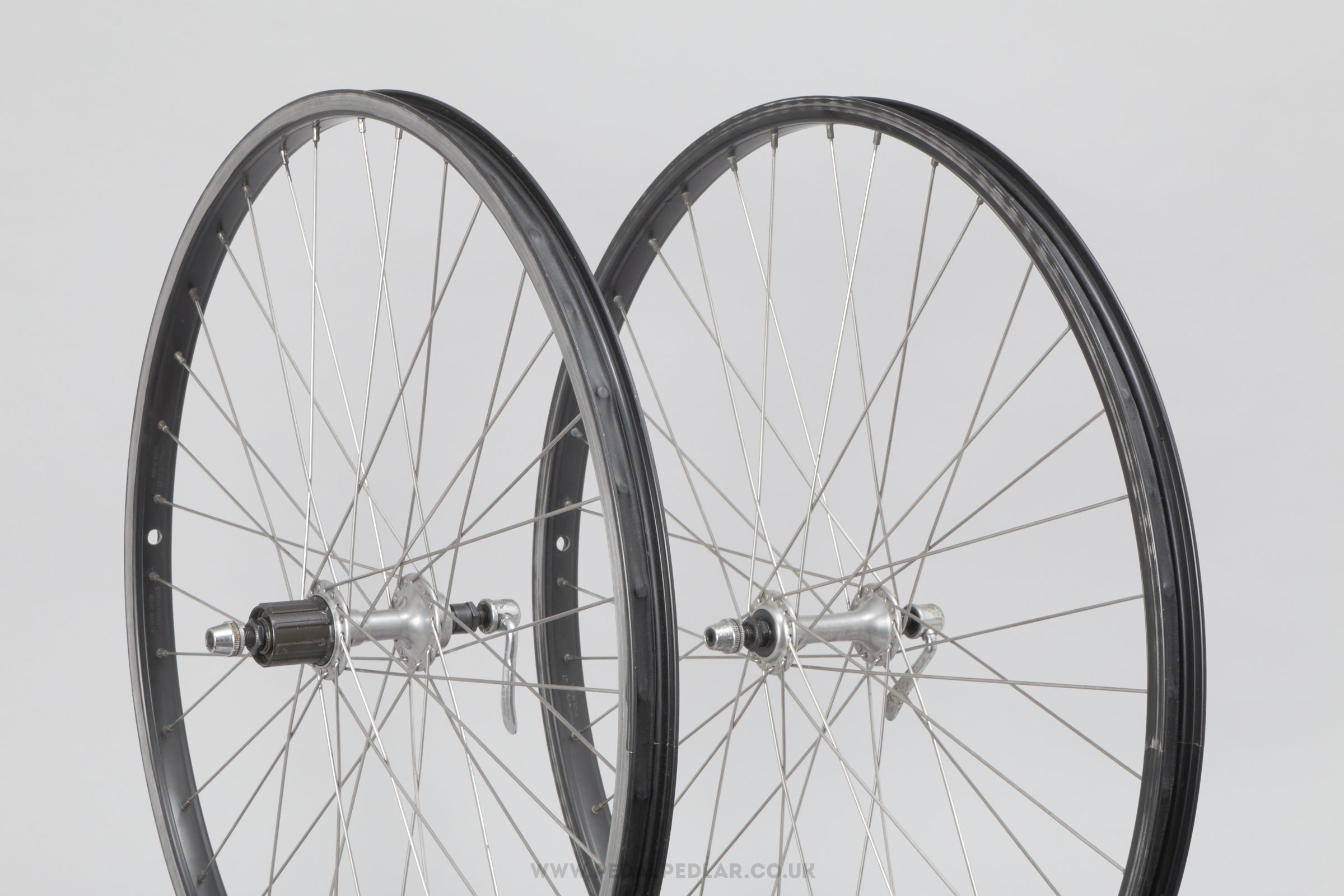
Shimano Deore LX (HB-M550 / FH-M550) / Weinmann Z121 Classic 26" Clincher MTB Wheels
£168.75 £225.00
✓ Original classic wheels - produced in the 1990s
✓ Professionally checked & serviced
✓ Worldwide shipping
Shimano Deore LX wheels built with Weinmann Z121 rims, the hubs hailing from Japan and in production during the 1990s. Made from aluminium/steel and weighing in at 2.4 kg. A fine choice for keeping your classic bike authentic, but also great for any other compatible bike too.
The wheels have been serviced, checked by one of our mechanics and graded as good condition, but do take a good look at the detailed photos so you can see the cosmetic condition before you buy.OVERVIEW
Rim Condition - Good
Model ID - HB-M550 / FH-M550
Production Era - 1990s
Country - Japanese
Material - Aluminium/Steel
Weight - 2.414 kg
Stock Code - U-W-PR44C
TECHNICAL INFO
Rim Size - 26" Clincher
Bike Type - MTB
Drilling (F/R) - 36/36 Hole
Spacing (O.L.D.) (F / R) - 100 mm / 135 mm
Speed - 6 Speed, 7 Speed
Sprocket Fitting - Shimano Uniglide or Hyperglide
-
▼SHIPPING, TAXES & RETURNS
-
We've been safely sending orders around the world since 2010. There's a handy shipping calculator on the shopping cart page so you can see the cost of postage as soon as you've added it to your basket. Your order will be carefully packed and sent with tracking & insurance, we despatch most orders within 2-3 days but larger items and orders placed before the weekend can take an extra day or two to process.
We accept returns, please notify us within 14 days and ensure the item arrives back with us no later than 30 days after the order was received.
EU Customers – for orders under €150 (excluding shipping), VAT will be collected at checkout – no extra import fees to pay on delivery! For orders over €150 any import fees will be payable to the carrier before delivery.
USA Customers – import fees are now collected at checkout for all orders to the US, so there won’t be any surprise charges when your order arrives.
Other International Customers – local import fees may still apply, charged by your customs office or courier before delivery. These are not collected by us, so please check your local rates before purchasing.
Any applicable fees will appear at checkout.
Shimano Deore LX (HB-M550 / FH-M550) / Araya RX-7 Classic 26" Clincher MTB Wheels
£183.75 £245.00
✓ Original classic wheels - produced in the 1990s
✓ Professionally checked & serviced
✓ Worldwide shipping
Shimano Deore LX wheels built with Araya RX-7 rims, the hubs hailing from Japan and in production during the 1990s. Made from aluminium/steel and weighing in at 2.3 kg. A fine choice for keeping your classic bike authentic, but also great for any other compatible bike too.
The wheels have been serviced, checked by one of our mechanics and graded as good condition, but do take a good look at the detailed photos so you can see the cosmetic condition before you buy.OVERVIEW
Rim Condition - Good
Model ID - HB-M550 / FH-M550
Production Era - 1990s
Country - Japanese
Material - Aluminium/Steel
Weight - 2.285 kg
Stock Code - U-W-PR38C
TECHNICAL INFO
Rim Size - 26" Clincher
Bike Type - MTB
Drilling (F/R) - 36/36 Hole
Spacing (O.L.D.) (F / R) - 100 mm / 135 mm
Speed - 6 Speed, 7 Speed
Sprocket Fitting - Shimano Uniglide or Hyperglide
-
▼SHIPPING, TAXES & RETURNS
-
We've been safely sending orders around the world since 2010. There's a handy shipping calculator on the shopping cart page so you can see the cost of postage as soon as you've added it to your basket. Your order will be carefully packed and sent with tracking & insurance, we despatch most orders within 2-3 days but larger items and orders placed before the weekend can take an extra day or two to process.
We accept returns, please notify us within 14 days and ensure the item arrives back with us no later than 30 days after the order was received.
EU Customers – for orders under €150 (excluding shipping), VAT will be collected at checkout – no extra import fees to pay on delivery! For orders over €150 any import fees will be payable to the carrier before delivery.
USA Customers – import fees are now collected at checkout for all orders to the US, so there won’t be any surprise charges when your order arrives.
Other International Customers – local import fees may still apply, charged by your customs office or courier before delivery. These are not collected by us, so please check your local rates before purchasing.
Any applicable fees will appear at checkout.
SUBSCRIBE TO GET THE FIRST SCOOP
Exclusive content, new products, subscriber only promotions. Delivered to your inbox by tiny cyclists, every few weeks.
Don't worry, you can unsubscribe at any time.
PEDAL PEDLAR
T: 02036758003 // E: info@pedalpedlar.co.uk
© 2026 Pedal Pedlar.
Ecommerce Software by Shopify

